Huge reduction in meat-eating ‘essential’ to avoid climate breakdown
Overall scientific credibility: 'high', according to scientists who analyzed this article.
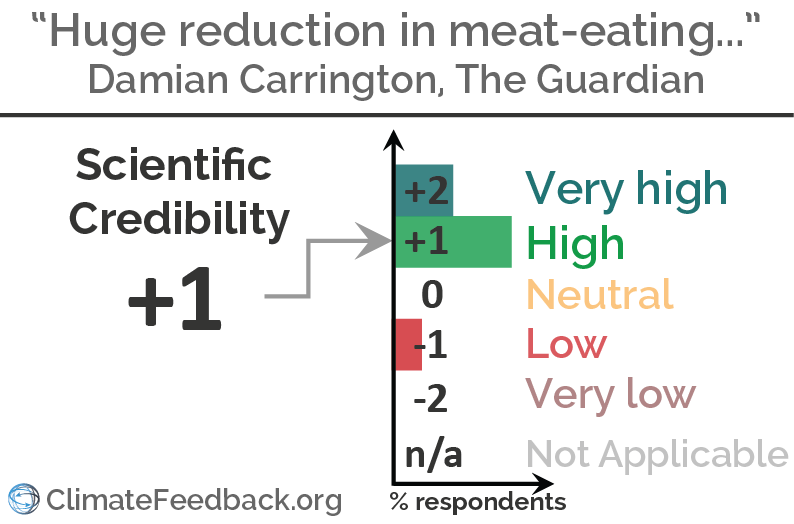
Find more details in Climate Feedback's analysis
Huge reduction in meat-eating ‘essential’ to avoid climate breakdown
Overall scientific credibility: 'high', according to scientists who analyzed this article.

Find more details in Climate Feedback's analysis
This is the third station at the South Pole, I’m sure some of you know what happened to the other two stations[…] They were buried by snow.
Rasmus Benestad: The amount of snowfall increases with temperature as long as the temperature is below 0C—above this temperature, it turns into rain. The Antarctica is still well below the freezing point, and increased temperatures are expected to give increased snowfall because the air is capable of holding more moisture. Likewise, the sea-ice around the Antarctica form during winter, when the temperatures still are below freezing, and are therefore not a good indicator for the global warming. The sea-ice extent is more strongly influenced by the salinity of the surface water, ocean currents and winds. The Antarctic is a continent surrounded by oceans, and there is little sea-ice in summer when the temperatures are higher. The Arctic, on the other hand, is an ocean surrounded by continents, and has sea-ice both during winter and summer. In the Arctic, there has been a decline in the sea-ice, primarily during summer when the temperature go above the freezing point.
Where we have a glacier today, a thousand years ago we had a forest. It was warmer a thousand years ago than it is today.
Rasmus Benestad: The statement "it was warmer a thousand years ago than it is today" or 5,000 years ago has no good evidence—the discussion about Mendenhall glacier and how it reached a forest has a local perspective and is more complicated. Glaciers respond to not just temperature, but also precipitation and the wind directions. It shows that there are local/regional variations in climate and that the climate is sensitive to changing forcings/factors.
Temperatures cooled from about 1940 to 1975, and then they rose from about ’75 to about 2005 or so, and since then they’ve been flat or cooling.
Rasmus Benestad: The temperature curve from the amateur website Climate4You.org is misleading as it hides the time scales important for the case of climate change. Rather than showing a subselection of the monthly mean HadCRUT3 data, a better choice would be to show the annual mean values of the HadCRUT4 for the entire common period—also up to 2018. Also, there has not been any recent cooling—see https://physicsworld.com/a/pause-in-global-warming-was-never-real-scientists-say/
Our temperatures in Chicago vary from about -5 Fahrenheit to 95 Fahrenheit every year[…] I’m going to superimpose on this the amount that global surface temperatures have risen in the last 130 years[…] That’s what climate scientists tell us is a coming calamity
"Goreham confuses local and global temperatures when comparing the temperature variations in Chicago with the change in the global mean temperature. This is equivalent to comparing apples with bananas, two different types of quantities with different statistical characteristics." - Rasmus Benestad
Startling new research finds large buildup of heat in the oceans, suggesting a faster rate of global warming
Overall scientific credibility: 'high', according to scientists who analyzed this article.
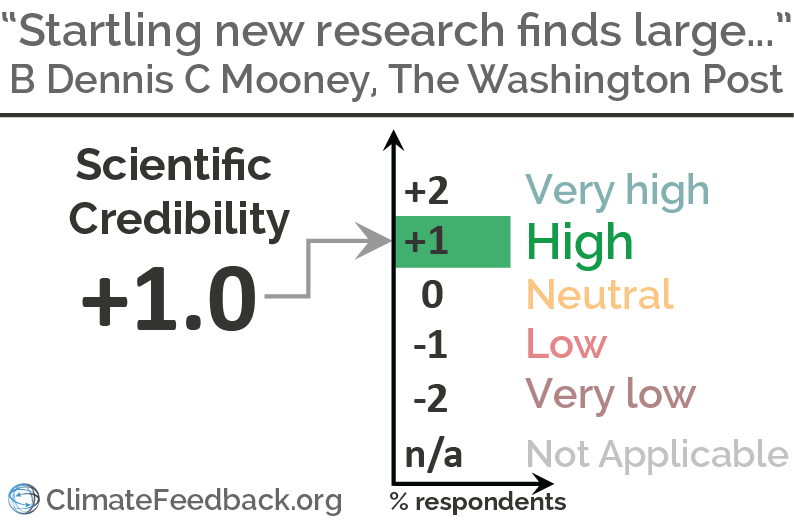
Find more details in the annotations below and in Climate Feedback's analysis
A growing number of scientists now believe solar activity is the real culprit behind so-called climate change.
This claim is inconsistent with science:

Find more details in Climate Feedback's analysis of this article
Scientists say halting deforestation 'just as urgent' as reducing emissions
Overall scientific credibility: 'neutral' to 'high', according to scientists who analyzed this article.
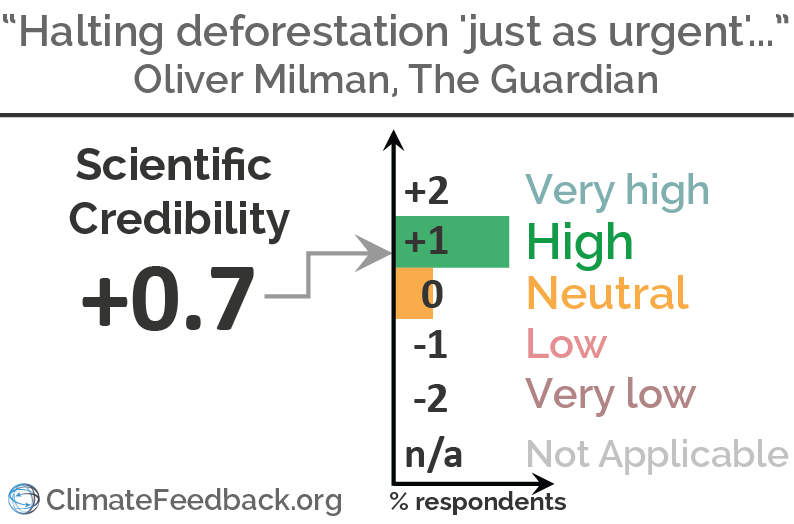
Find more details in the annotations below and in Climate Feedback's analysis
Hurricane Florence is not climate change or global warming. It's just the weather.
Overall scientific credibility: 'low' to 'very low', according to scientists who analyzed this article.
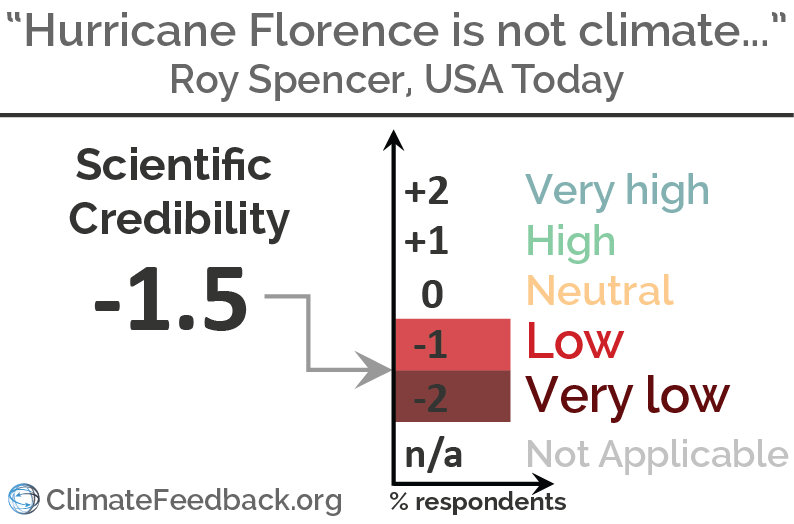
Find more details in the annotations below and in Climate Feedback's analysis
Arctic’s strongest sea ice breaks up for first time on record
Overall scientific credibility: 'high', according to scientists who analyzed this article.
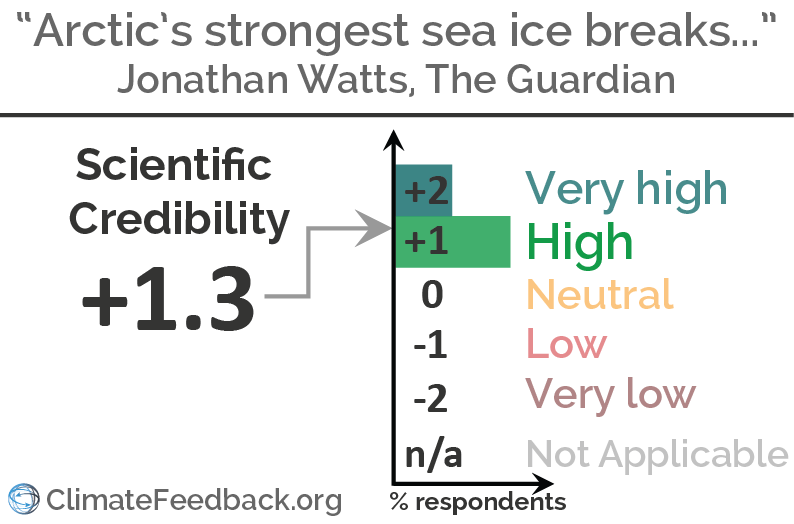
Find more details in the annotations below and in Climate Feedback's analysis
Repeat after me: carbon dioxide is good for us
Overall scientific credibility: 'very low', according to scientists who analyzed this article.
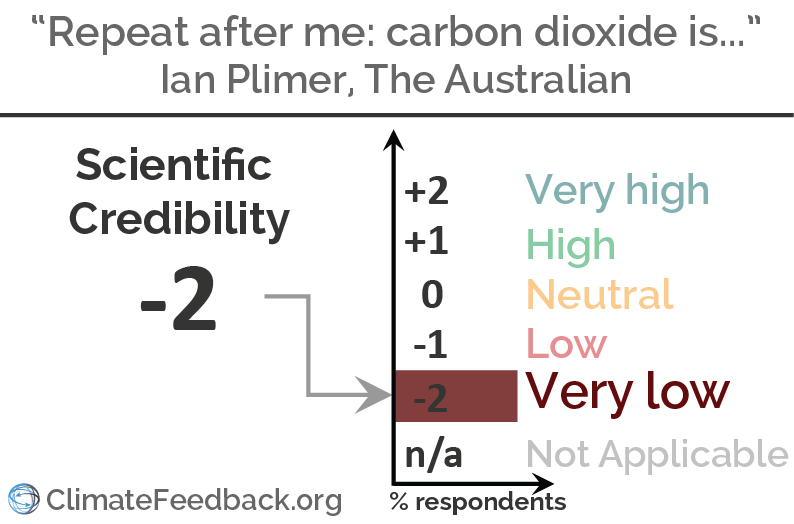
Find more details in the annotations below and in Climate Feedback's analysis
Domino-effect of climate events could move Earth into a ‘hothouse’ state
Overall scientific credibility: 'high', according to scientists who analyzed this article.
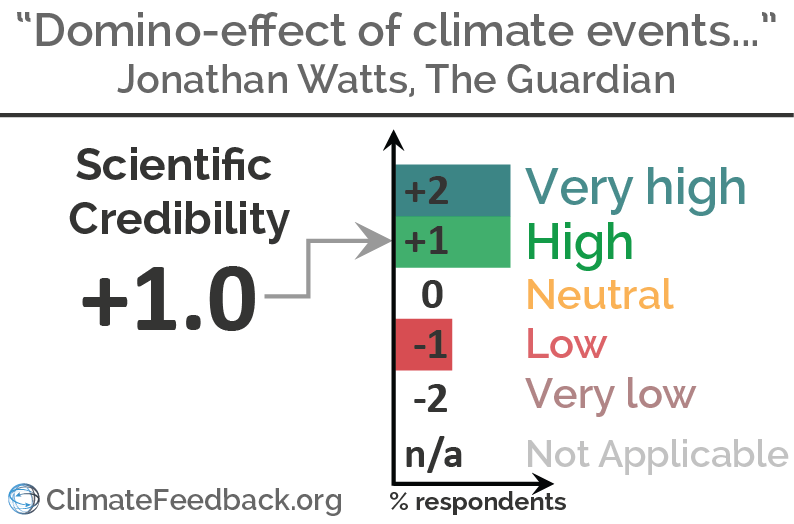
Find more details in the annotations below and in Climate Feedback's analysis
Climate change is supercharging a hot and dangerous summer
Overall scientific credibility: 'very high', according to scientists who analyzed this article.
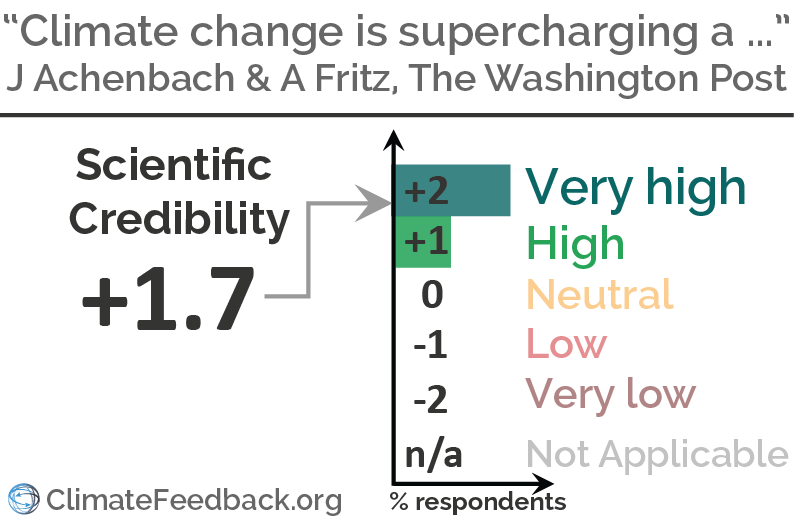
Find more details in the annotations below and in Climate Feedback's analysis
Spring Is Springing Sooner, Throwing Nature's Rhythms Out Of Whack Spring Is Springing Sooner, Throwing Nature's Rhythms Out Of Whack Listen· 7:02
Overall scientific credibility: 'high' to 'very high', according to scientists who analyzed this article.
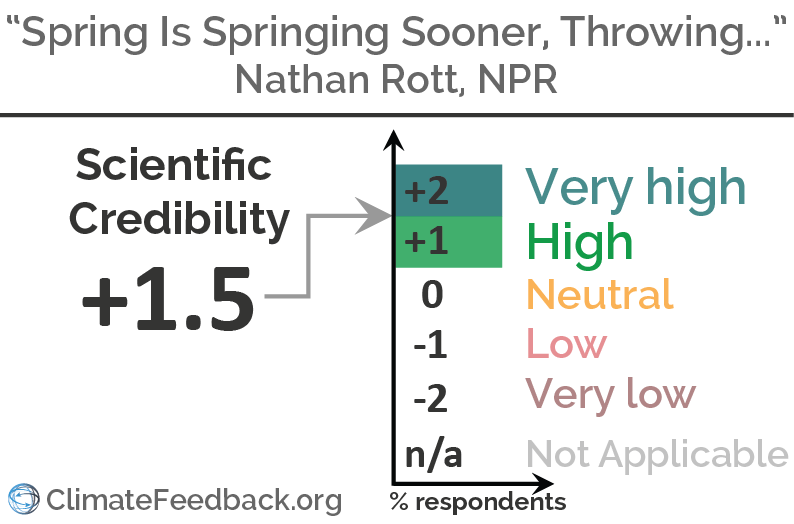
Find more details in the annotations below and in Climate Feedback's analysis
Global warming could be far worse than predicted, new study suggests
Overall scientific credibility: 'high', according to scientists who analyzed this article.
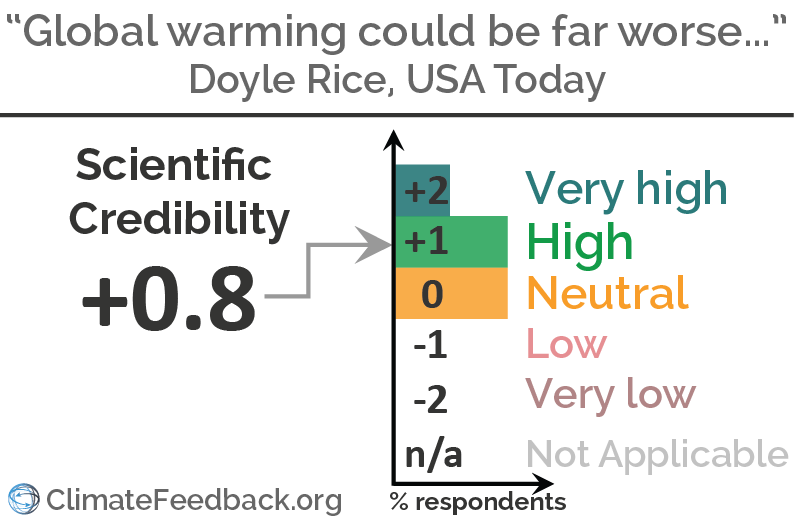
Find more details in the annotations below and in Climate Feedback's analysis
Scorching Earth: Global warming to blame for all-time heat records being set worldwide, as experts warn stifling temperatures will continue to soar
Overall scientific credibility: 'neutral', according to scientists who analyzed this article.
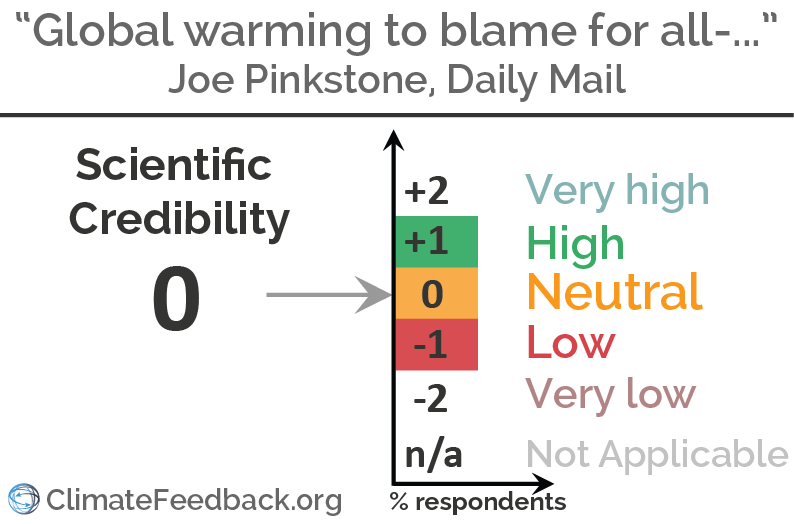
Find more details in the annotations below and in Climate Feedback's analysis
Ross McKitrick: All those warming-climate predictions suddenly have a big, new problem
Overall scientific credibility: 'low', according to scientists who analyzed this article.
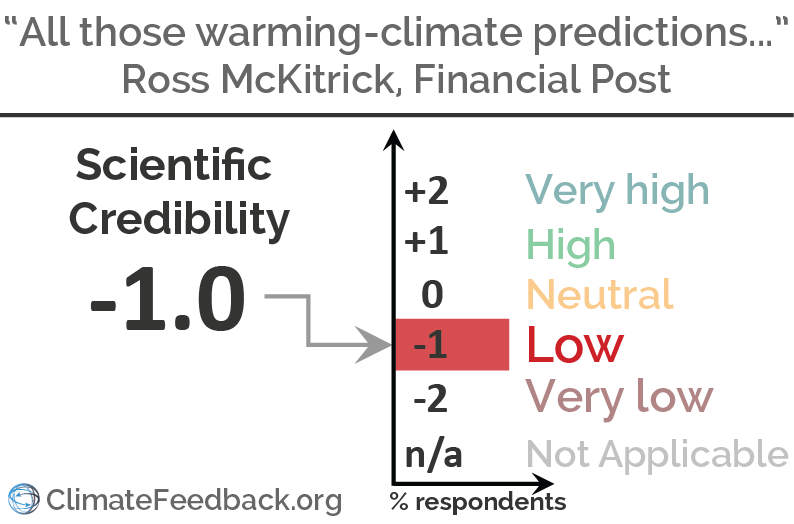
Find more details in the annotations below and in Climate Feedback's analysis
Antarctic ice loss has tripled in a decade. If that continues, we are in serious trouble.
Overall scientific credibility: 'high', according to scientists who analyzed this article.
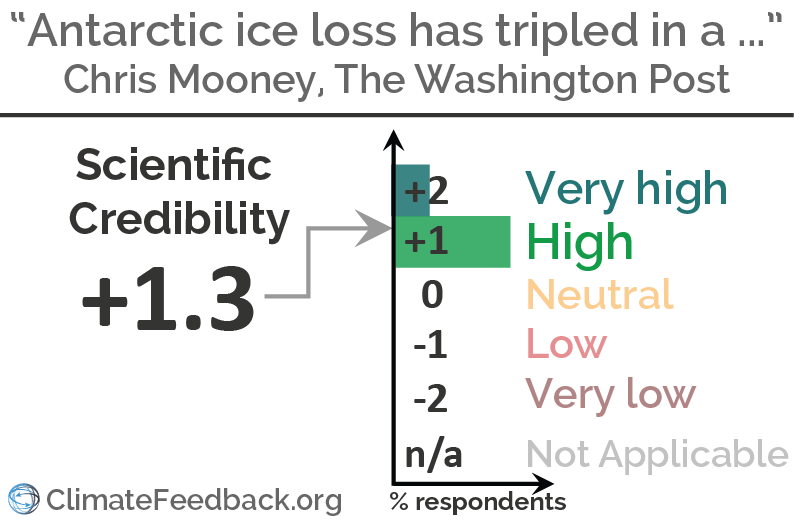
Find more details in the annotations below and in Climate Feedback's analysis
Hurricanes Are Moving Slower—And That's a Huge Problem
Overall scientific credibility: 'very high', according to scientists who analyzed this article.
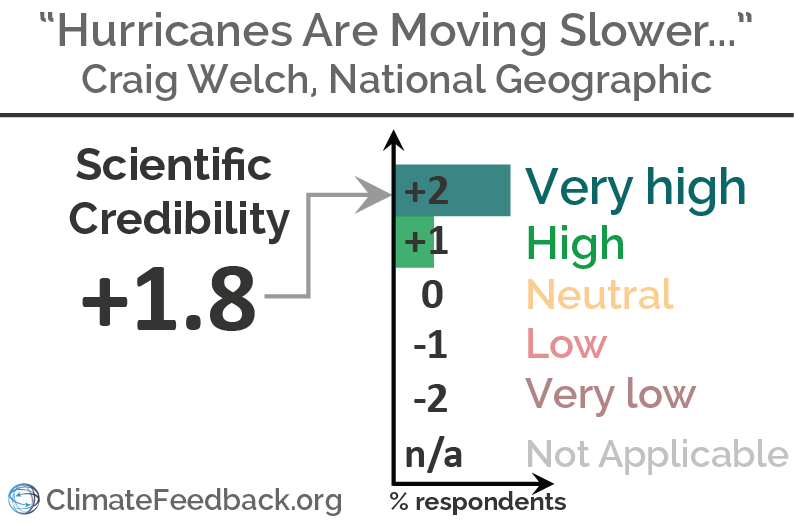
Find more details in the annotations below and in Climate Feedback's analysis
In a Warming West, theRio Grande Is Drying Up
Overall scientific credibility: 'high', according to scientists who analyzed this article.
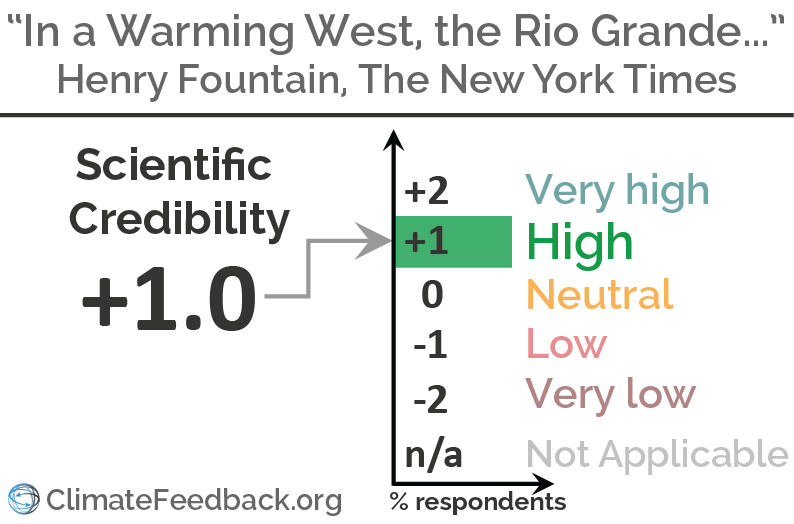
Find more details in the annotations below and in Climate Feedback's analysis
The Sea Is Rising, but Not Because of Climate Change
Overall scientific credibility: 'very low', according to scientists who analyzed this article.
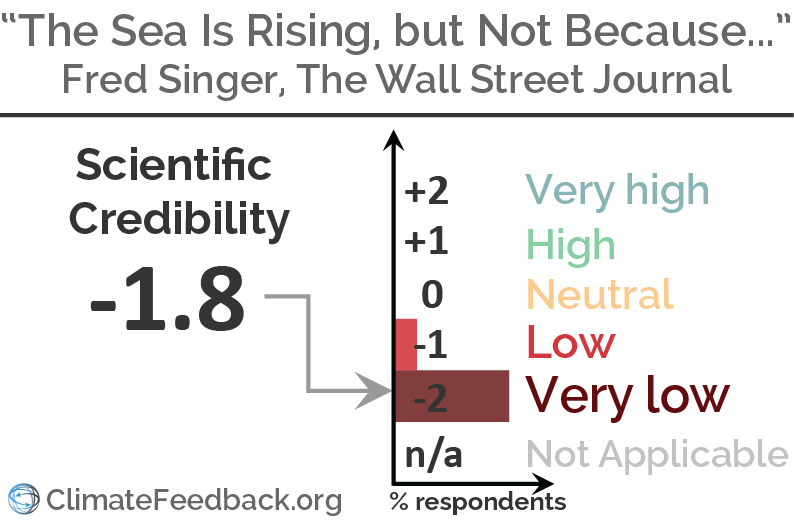
Find more details in the annotations below and in Climate Feedback's analysis
The amount of carbon dioxide in the atmosphere just hit its highest level in 800,000 years and scientists predict deadly consequences
Overall scientific credibility: 'neutral', according to scientists who analyzed this article.
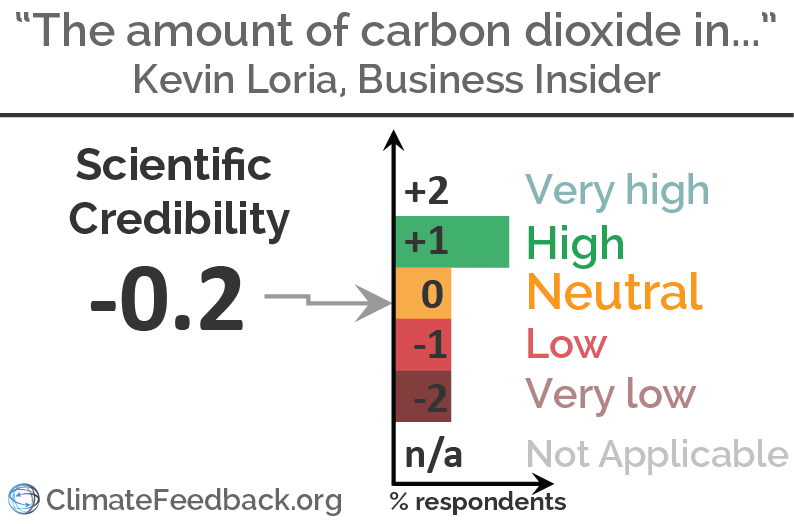
Find more details in the annotations below and in Climate Feedback's analysis
Not all scientists agree on cause of Great Barrier Reef damage
Overall scientific credibility: 'low', according to scientists who analyzed this article.
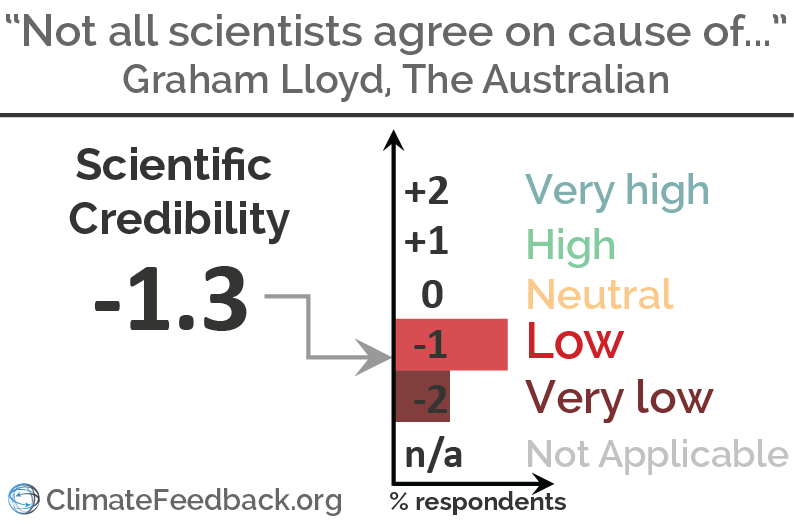
Find more details in the annotations below and in Climate Feedback's analysis
A Startling New Discovery Could Destroy All Those Global Warming Doomsday Forecasts
Overall scientific credibility: 'very low', according to scientists who analyzed this article.
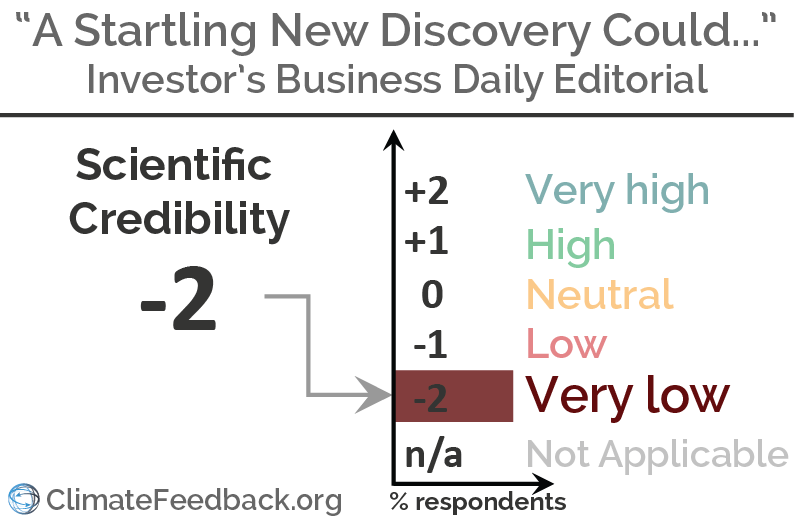
Find more details in the annotations below and in Climate Feedback's analysis
The Arctic’s carbon bomb might be even more potent than we thought
Overall scientific credibility: 'very high', according to scientists who analyzed this article.
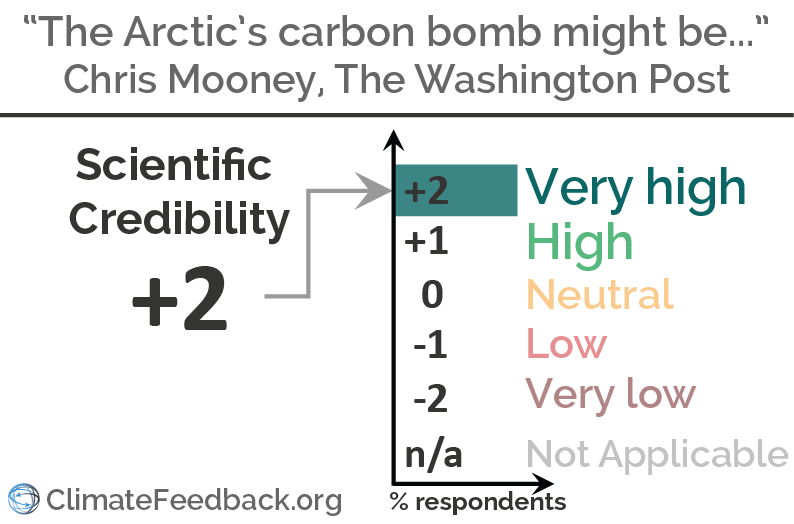
Find more details in the annotations below and in Climate Feedback's analysis
Polar bears keep thriving even as global warming alarmists keep pretending they’re dying
Overall scientific credibility: 'very low', according to scientists who analyzed this article.
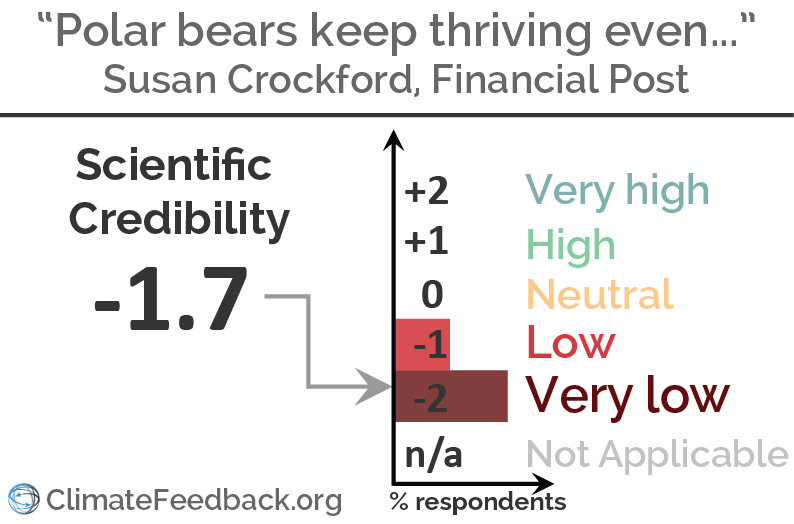
Find more details in the annotations below and in Climate Feedback's analysis
Satellite observations show sea levels rising, and climate change is accelerating it
Overall scientific credibility: 'very high', according to scientists who analyzed this article.
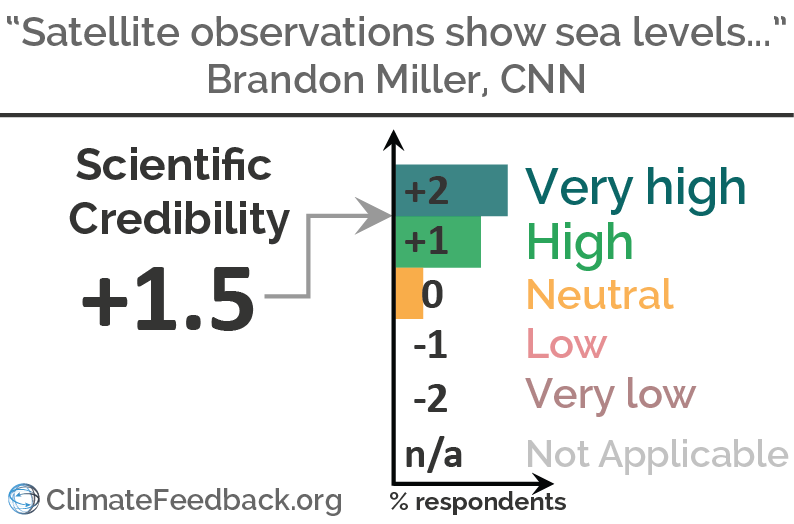
Find more details in the annotations below and in Climate Feedback's analysis
Scientists Announce That The Great Barrier Reef is Officially “Terminal”
Overall scientific credibility: 'neutral' to 'low', according to scientists who analyzed this article.
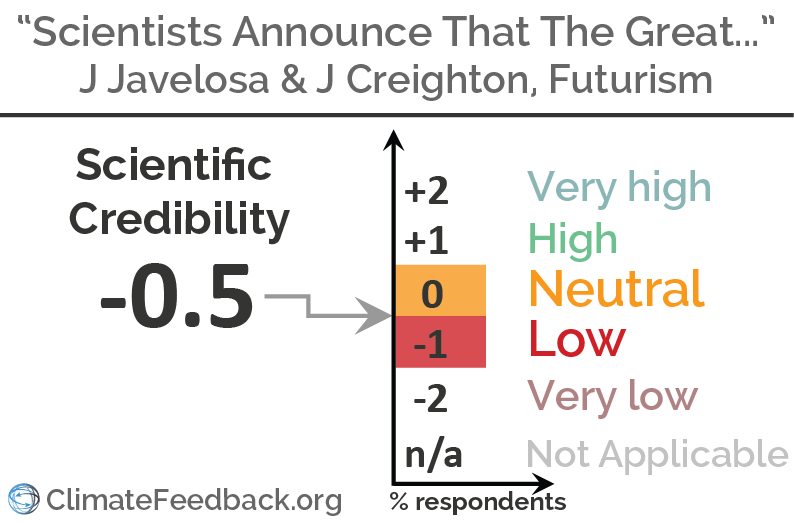
Find more details in the annotations below and in Climate Feedback's analysis
An Iceberg the Size of DelawareJust Broke Away From Antarctica
Overall scientific credibility: 'very high', according to scientists who analyzed this article.
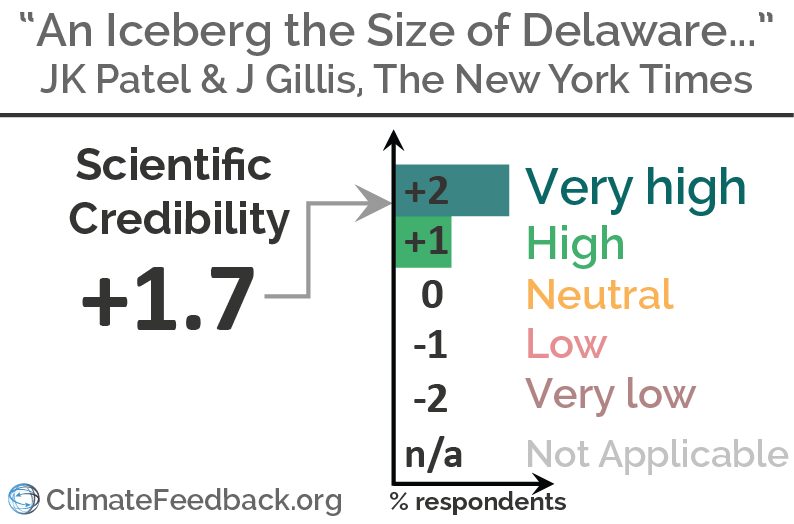
Find more details in the annotations below and in Climate Feedback's analysis
Heart-Wrenching Video Shows Starving Polar Bear on Iceless Land
Overall scientific credibility: 'neutral', according to scientists who analyzed this article.
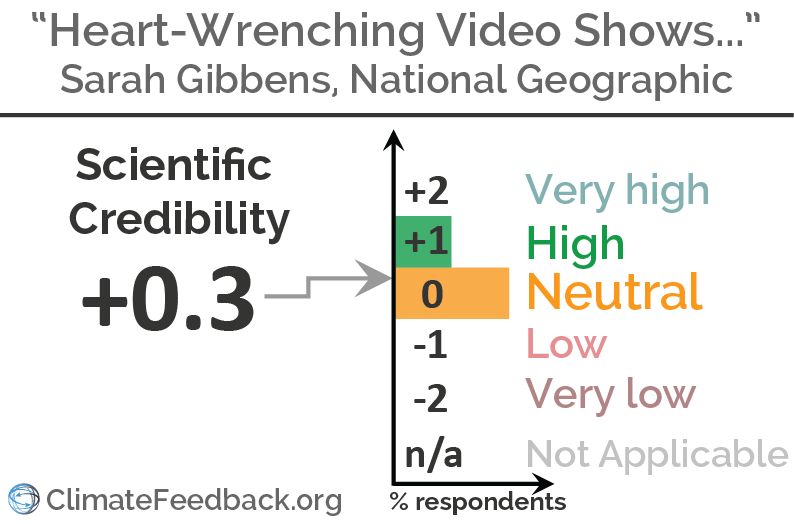
Find more details in the annotations below and in Climate Feedback's analysis
If Everyone Ate Beans Instead of Beef
Overall scientific credibility: 'debated', according to scientists who analyzed this article.
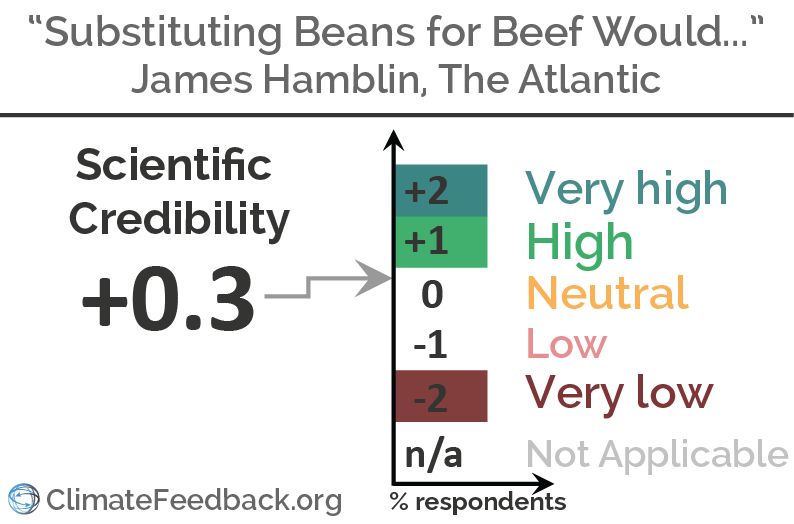
Find more details in the annotations below and in Climate Feedback's analysis
Arctic’s Winter Sea Ice Drops to Its Lowest Recorded Level
Overall scientific credibility: 'high', according to scientists who analyzed this article.
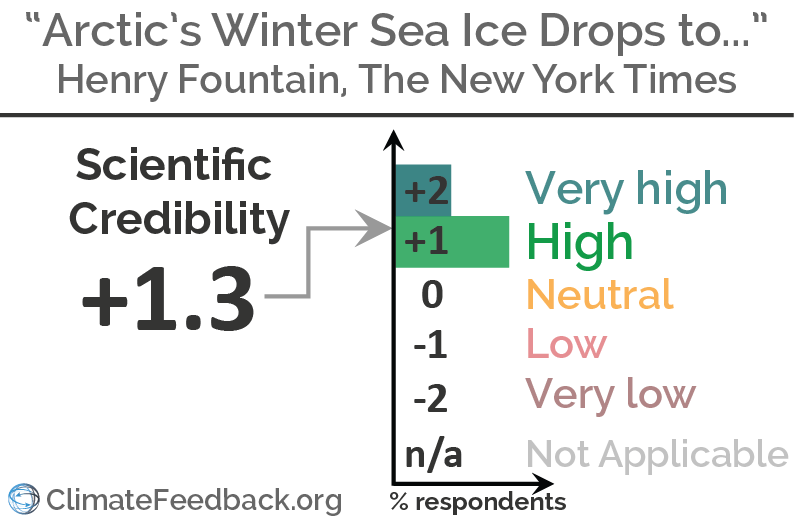
Find more details in the annotations below and in Climate Feedback's analysis
Global Warming Study Canceled After Humiliating Discovery
Overall scientific credibility: 'low', according to scientists who analyzed this article.
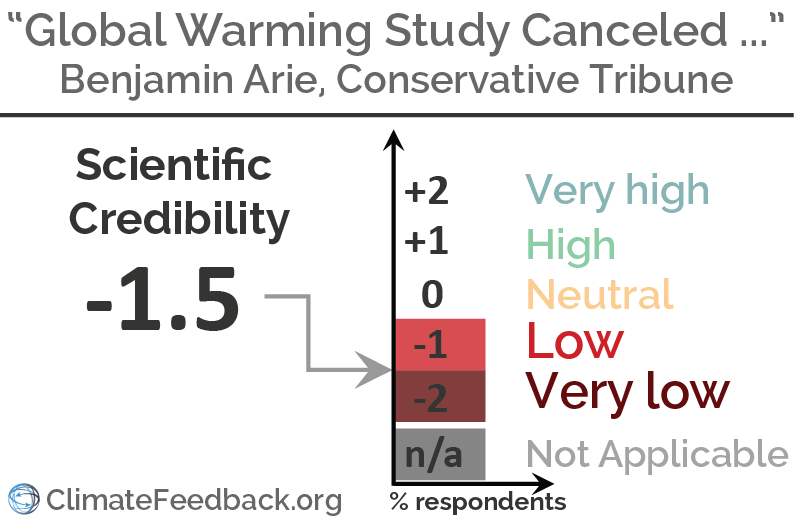
Find more details in the annotations below and in Climate Feedback's analysis
The Sea Level Around Florida Is Rising Six Times Faster Than Average
Overall scientific credibility: 'neutral' to 'high', according to scientists who analyzed this article.
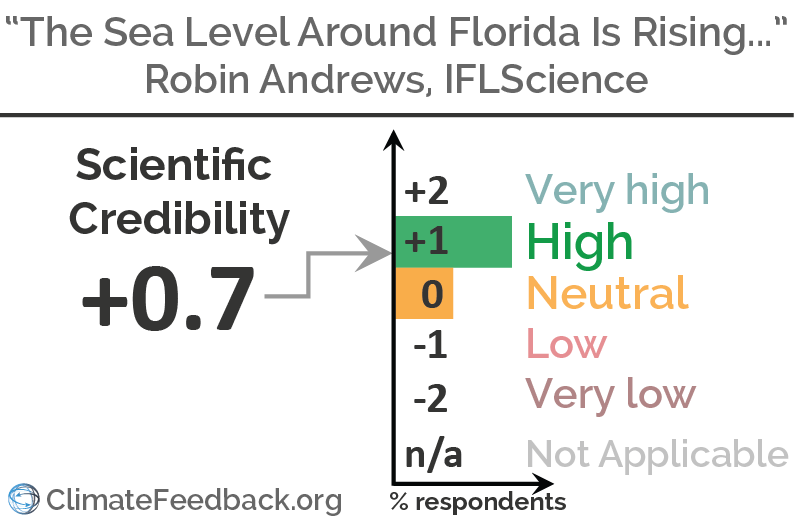
Find more details in the annotations below and in Climate Feedback's analysis
Earth Sets a Temperature Record for the Third Straight Year
Overall scientific credibility: 'very high', according to scientists who analyzed this article.
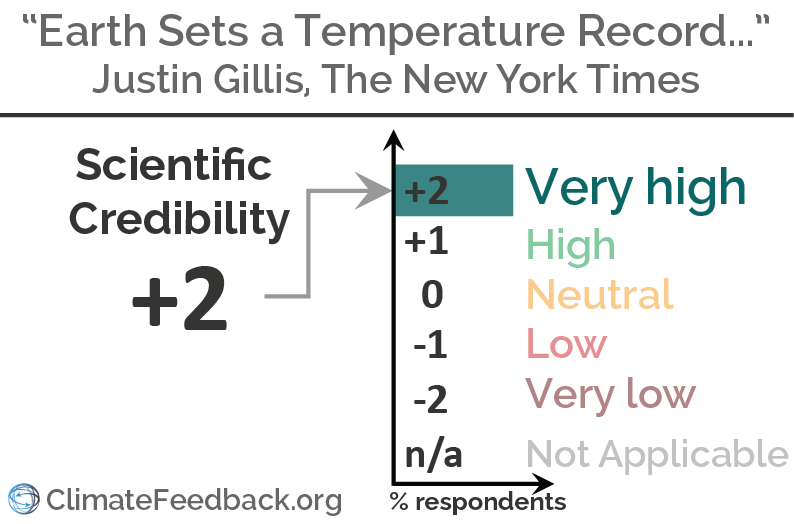
Find more details in the annotations below and in Climate Feedback's analysis
Jerry Brown Blames Climate Change for California Fires: ‘The New Normal’
Overall scientific credibility: 'very low', according to scientists who analyzed this article.
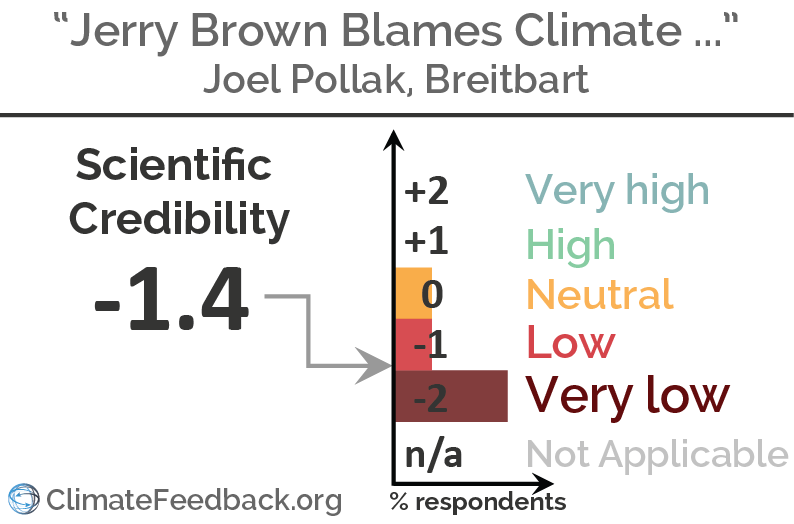
Find more details in Climate Feedback's analysis
STUDY: Satellites Show No Acceleration In Global Warming For 23 Years
Overall scientific credibility: 'low', according to scientists who analyzed this article.
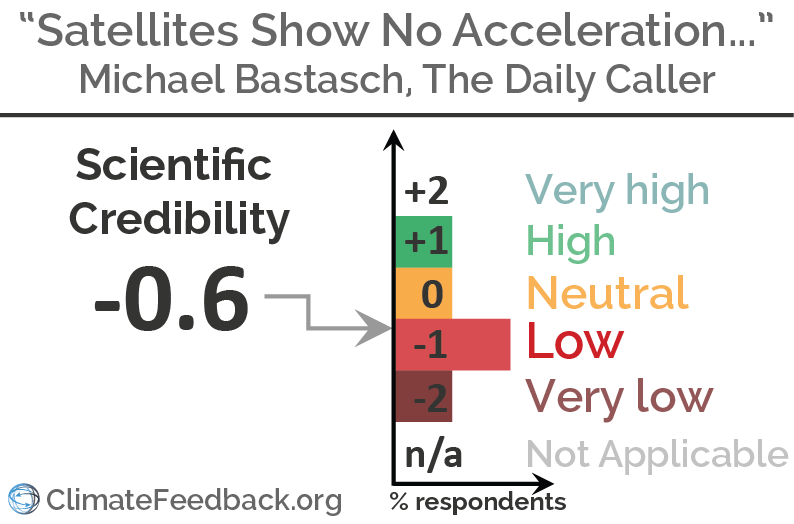
Find more details in the annotations below and in Climate Feedback's analysis
Ice Apocalypse
Overall scientific credibility: 'high', according to scientists who analyzed this article.
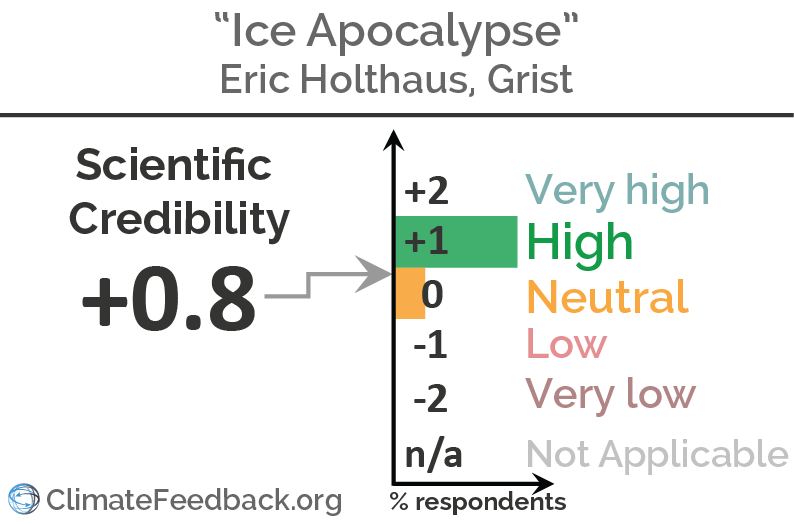
Find more details in the annotations below and in Climate Feedback's analysis
The three-degree world: the cities that will be drowned by global warming
Overall scientific credibility: 'mixed', according to scientists who analyzed this article.
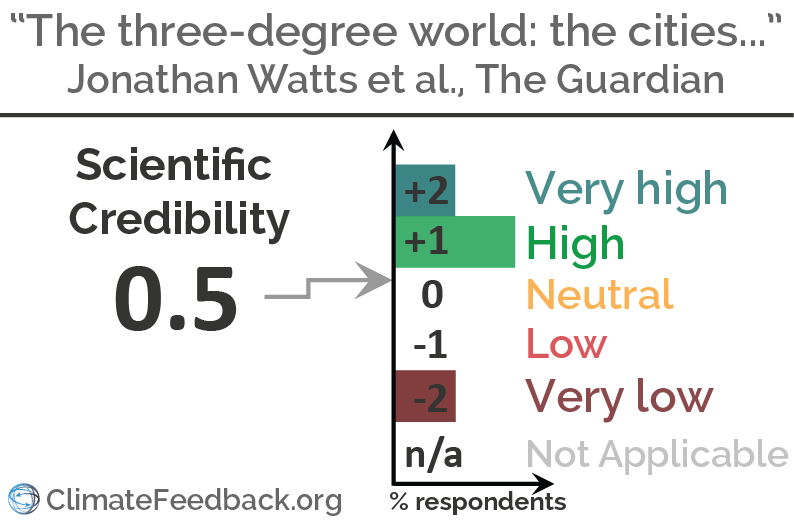
Find more details in the annotations below and in Climate Feedback's analysis
Climate change might be worse than thought after scientists find major mistake in water temperature readings
Overall scientific credibility: 'low', according to scientists who analyzed this article.
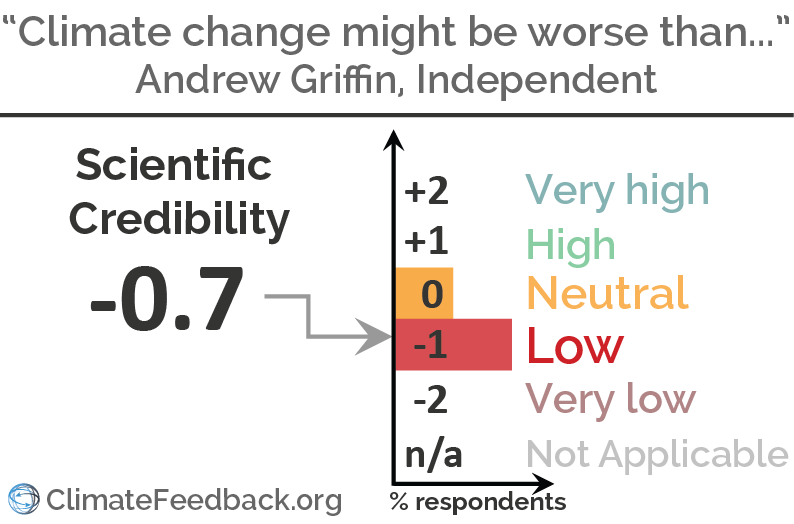
Find more details in the annotations below and in Climate Feedback's analysis
Misguided renewable energy policies will ruin nation
Overall scientific credibility: 'very low', according to scientists who analyzed this article.
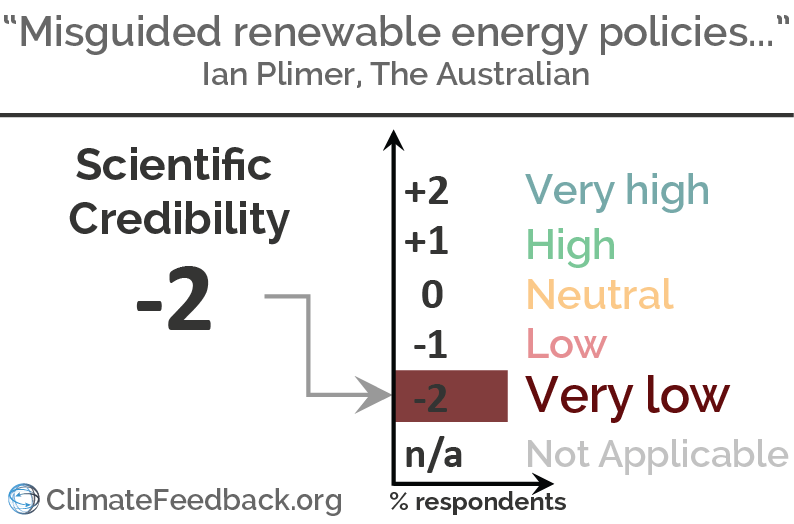
Find more details in the annotations below and in Climate Feedback's analysis
More acidic oceans 'will affect all sea life'
Overall scientific credibility: 'high', according to scientists who analyzed this article.
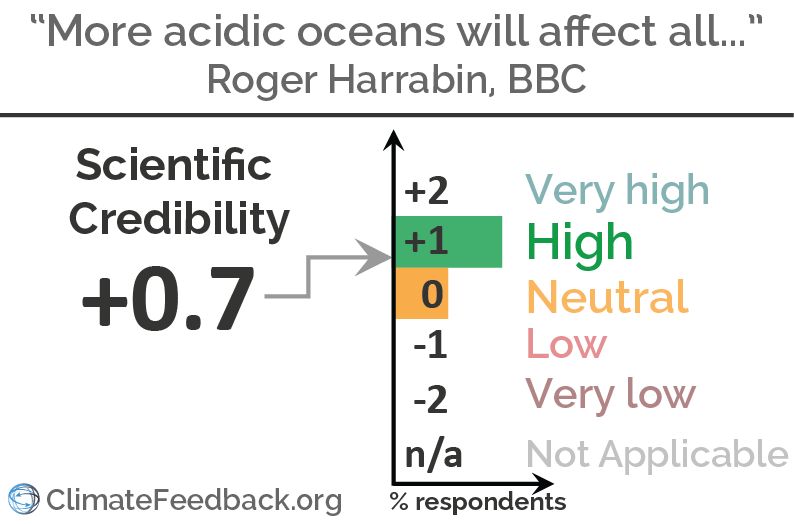
Find more details in the annotations below and in Climate Feedback's analysis
Climate Change Is Complex. We’veGot Answers to Your Questions.
Overall scientific credibility: 'very high', according to scientists who analyzed this article.
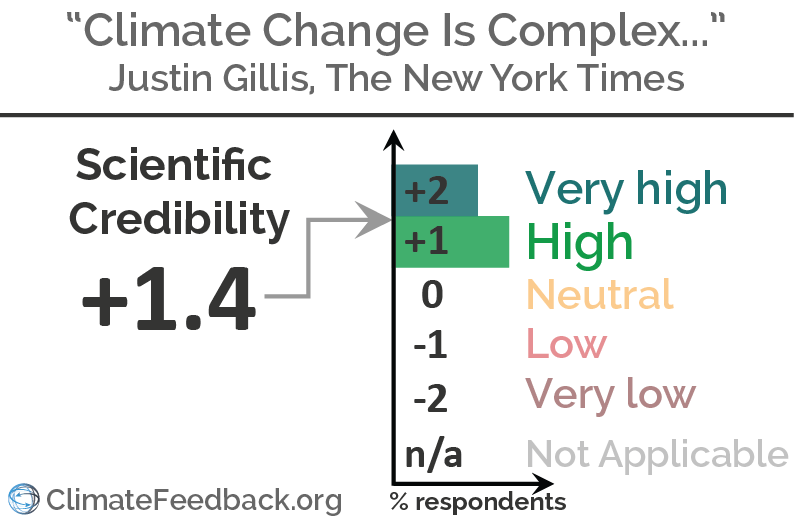
Find more details in the annotations below and in Climate Feedback's analysis
Climate Scientists: Climate Models Have Overestimated Global Warming
Overall scientific credibility: 'very low', according to scientists who analyzed this article.
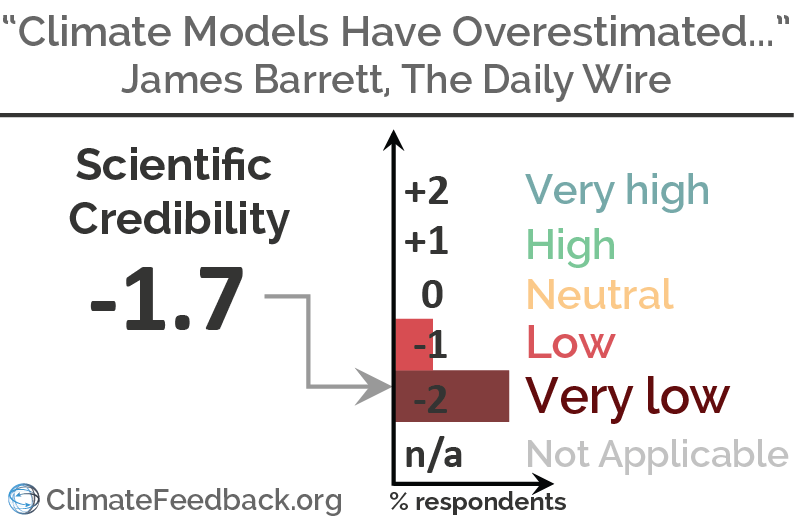
Find more details in the annotations below and in Climate Feedback's analysis
Has Climate Change Intensified 2017’s Western Wildfires?
Overall scientific credibility: 'very high', according to scientists who analyzed this article.
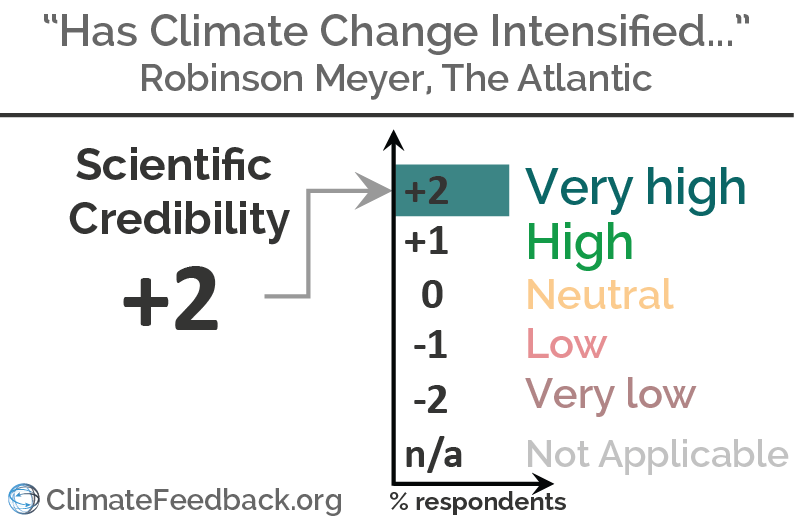
Find more details in the annotations below and in Climate Feedback's analysis
Did Climate Change Intensify Hurricane Harvey?
Overall scientific credibility: 'high' to 'very high', according to scientists who analyzed this article.
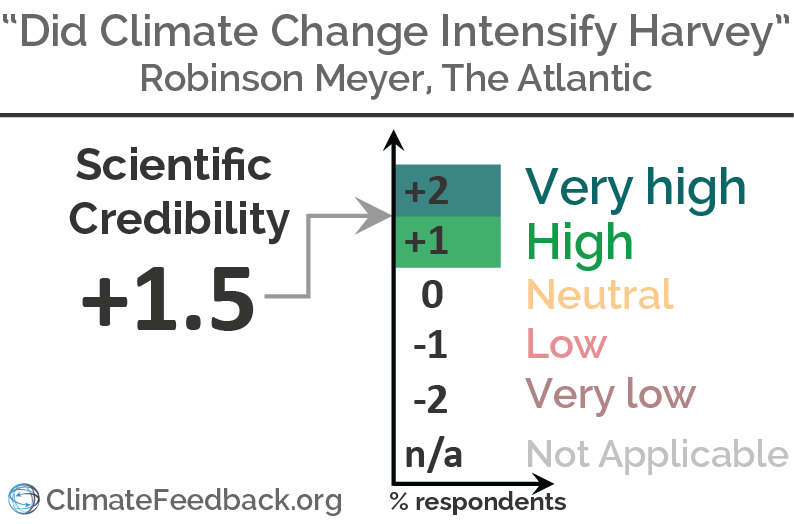
Find more details in the annotations below and in Climate Feedback's analysis
Alaska’s PermafrostIs Thawing
Overall scientific credibility: 'high' to 'very high', according to scientists who analyzed this article.
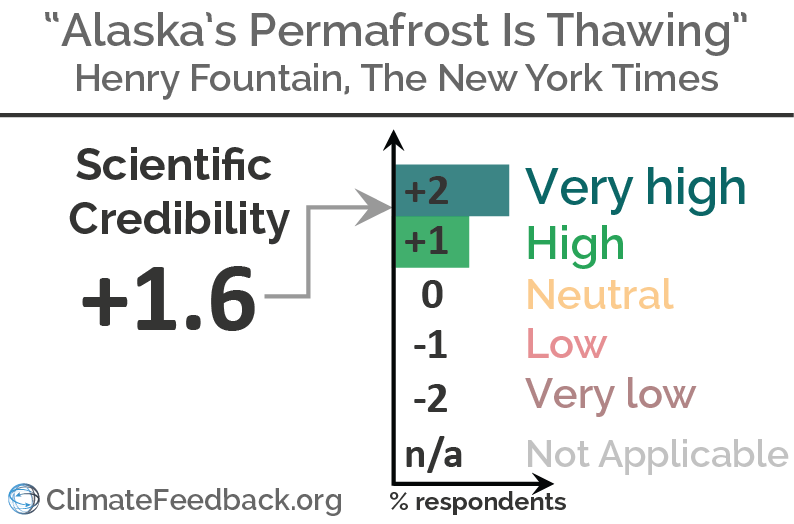
Find more details in the annotations below and in Climate Feedback's analysis
Global Ocean Circulation Appears To Be Collapsing Due To A Warming Planet
Overall scientific credibility: 'high', according to scientists who analyzed this article.
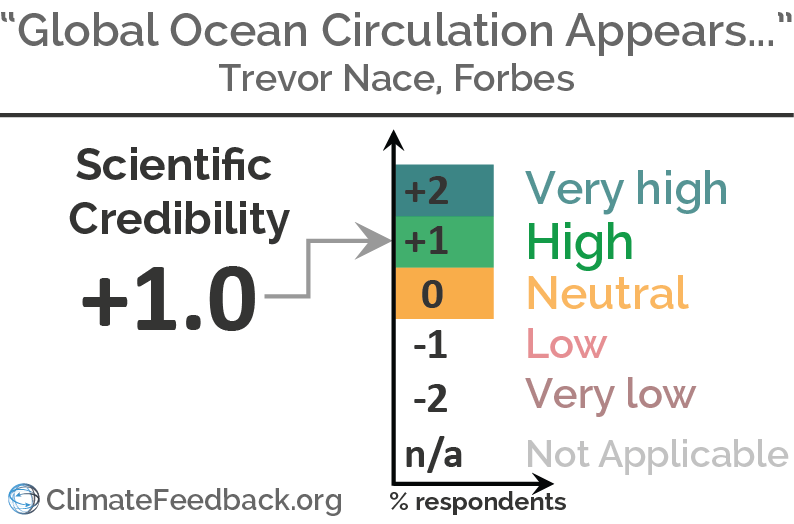
Find more details in the annotations below and in Climate Feedback's analysis
Climate Change Isn’t the End of the World
Overall scientific credibility: 'low' to 'very low', according to scientists who analyzed this article.
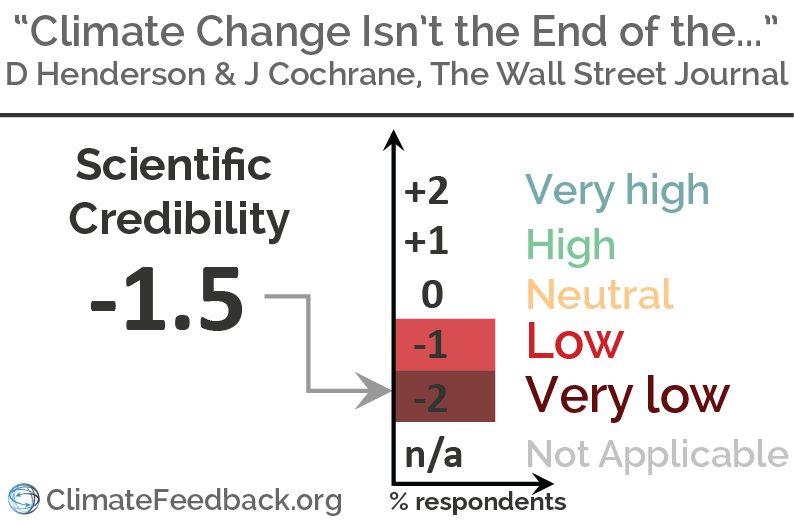
Find more details in the annotations below and in Climate Feedback's analysis
2017 is so unexpectedly warm it is freaking out climate scientists
Overall scientific credibility: 'high', according to scientists who analyzed this article.
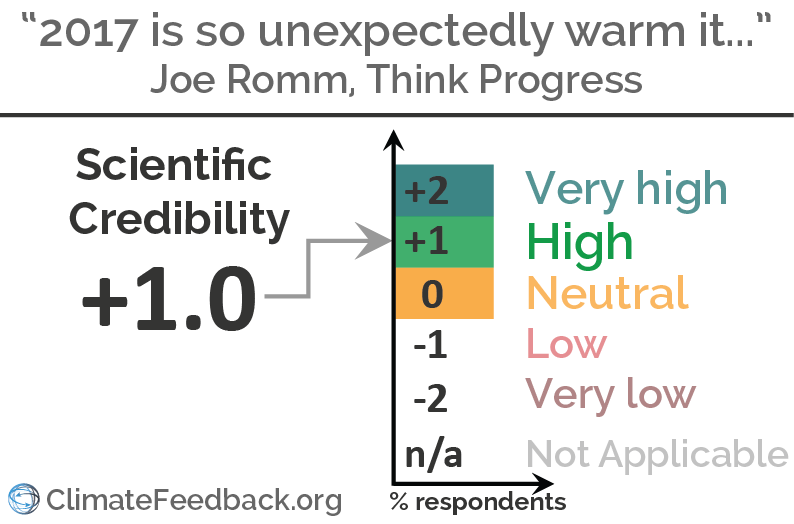
Find more details in the annotations below and in Climate Feedback's analysis
The Uninhabitable Earth
Overall scientific credibility: 'low', according to scientists who analyzed this article.
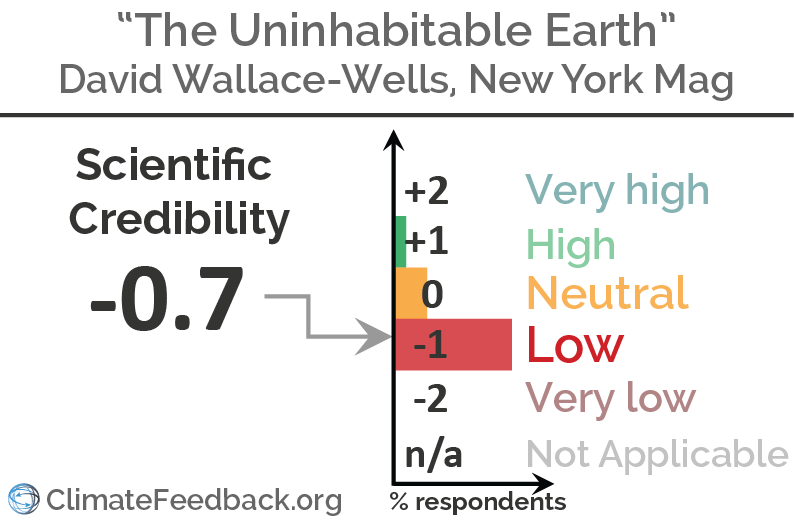
Find more details in the annotations below and in Climate Feedback's analysis
DELINGPOLE: ‘Nearly All’ Recent Global Warming Is Fabricated, Study Finds
Overall scientific credibility: 'very low', according to scientists who analyzed this article.
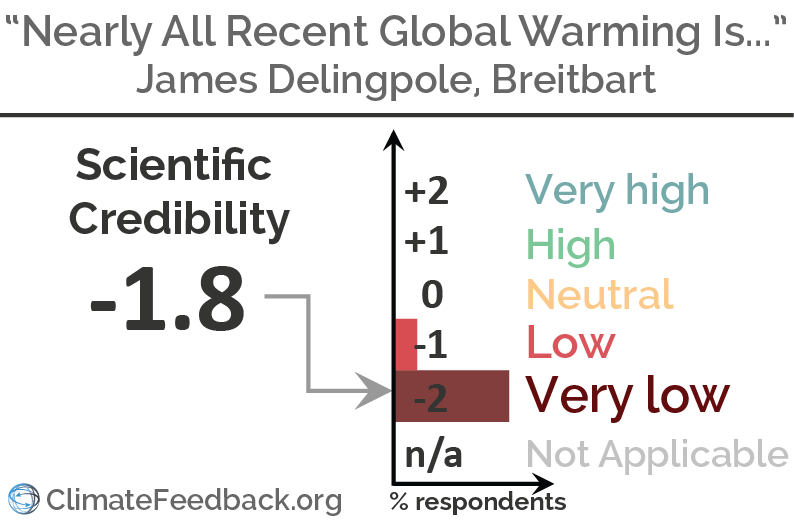
Find more details in the annotations below and in Climate Feedback's analysis
The American South Will Bear the Worst of Climate Change’s Costs
Overall scientific credibility: 'high', according to scientists who analyzed this article.
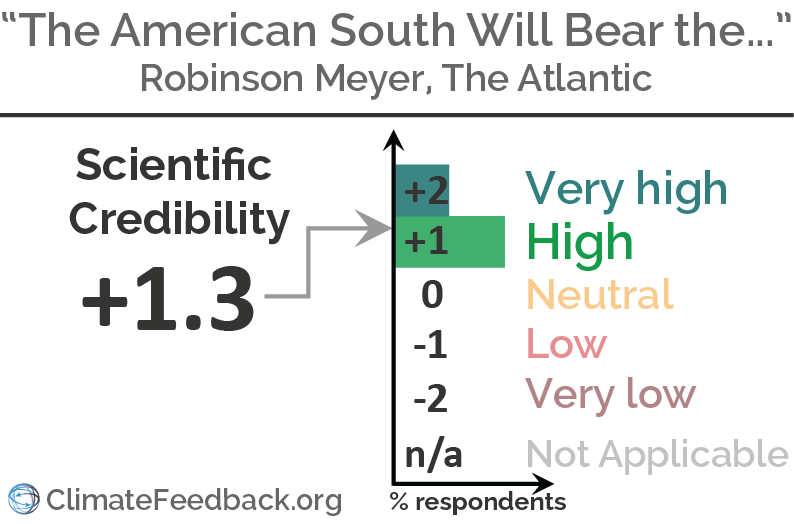
Find more details in the annotations below and in Climate Feedback's analysis
95-Degree Days: How Extreme Heat Could Spread Across the World
Overall scientific credibility: 'high', according to scientists who analyzed this article.
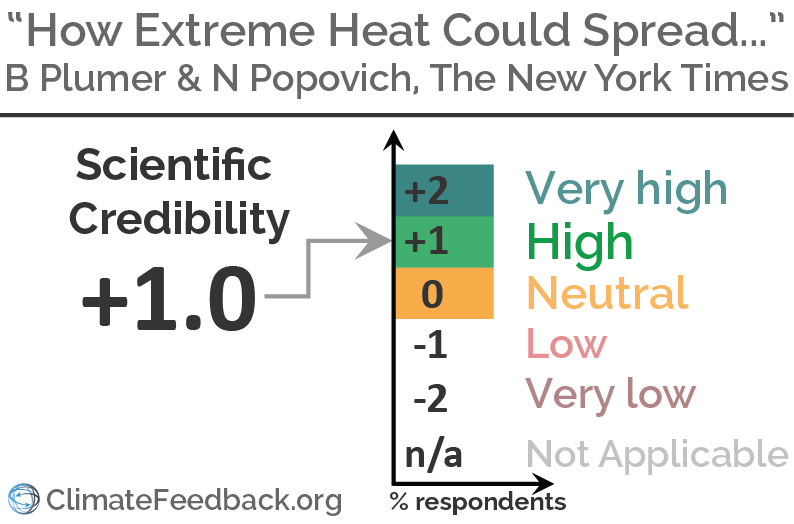
Find more details in the annotations below and in Climate Feedback's analysis
most likely the primary control knob is the ocean waters and this environment that we live in
Scientists analyzed this claim and concluded it is Incorrect:

Find more details in Climate Feedback's analysis of this article
DELINGPOLE: ‘Global Warming’ Is a Myth, Say 58 Scientific Papers in 2017
Overall scientific credibility: 'very low', according to scientists who analyzed this article.
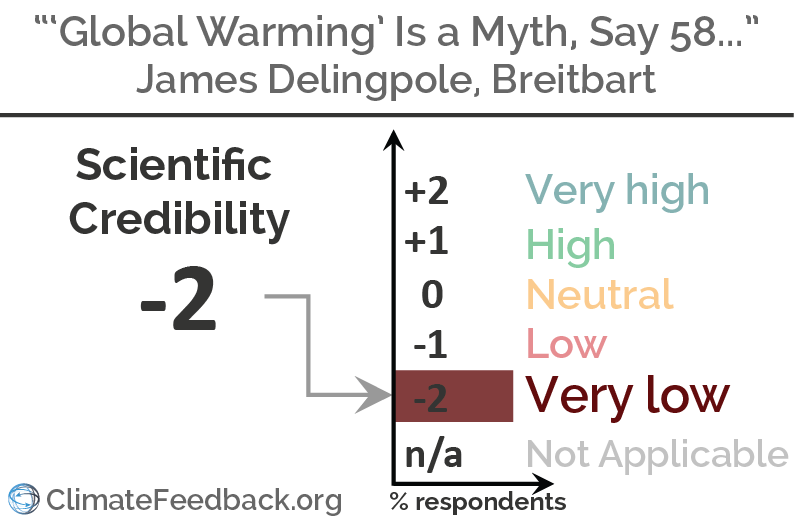
Find more details in the annotations below and in Climate Feedback's analysis
WHO: United States Among Least Polluting Nations on the Planet
Overall scientific credibility: 'very low', according to scientists who analyzed this article.
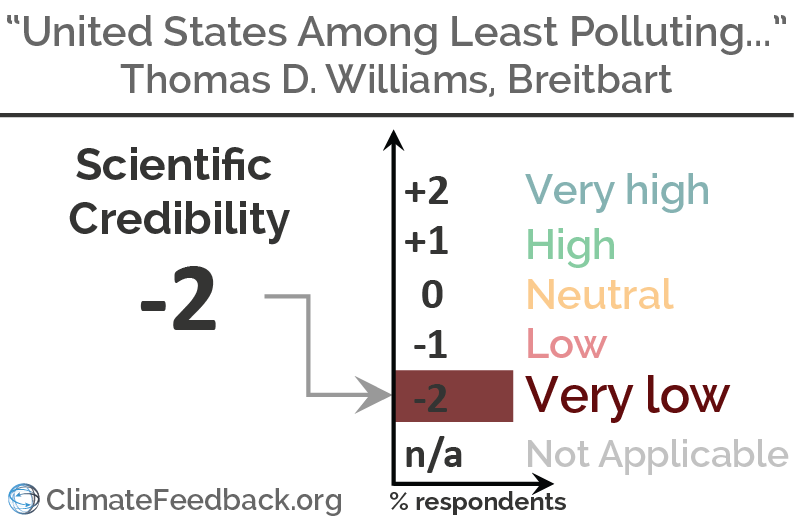
Find more details in the annotations below and in Climate Feedback's analysis
Trump should withdraw from Paris climate pact
Overall scientific credibility: 'very low', according to scientists who analyzed this article.
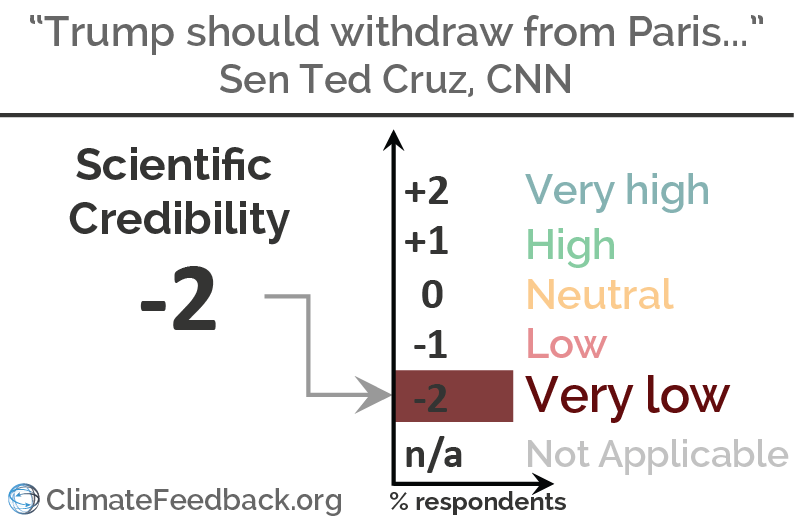
Find more details in the annotations below and in Climate Feedback's analysis
Key Findings
See scientists' annotations of key findings below
Historically, increases in atmospheric CO2 followed increases intemperature, they did not precede them. Therefore, CO2 levels could nothave forced temperatures to rise.
Solar forcings are not too small to explain twentieth century warming. In fact, their effect could be equal to or greater than the effect of CO2 in the atmosphere.
Scientists who analyzed this claim found it incorrect:

Find more details in Climate Feedback's analysis
Doubling the concentration of atmospheric CO2 from its pre-industrial level, in the absence of other forcings and feedbacks, would likely cause a warming of ~0.3°C to 1.1°C, almost 50 percent of which must already have occurred.
Scientists who analyzed this claim found it misleading:

Find more details in Climate Feedback's analysis
Racing to Find Answers in the Ice
Overall scientific credibility: 'high' to 'very high', according to 9 scientists who analyzed this article.
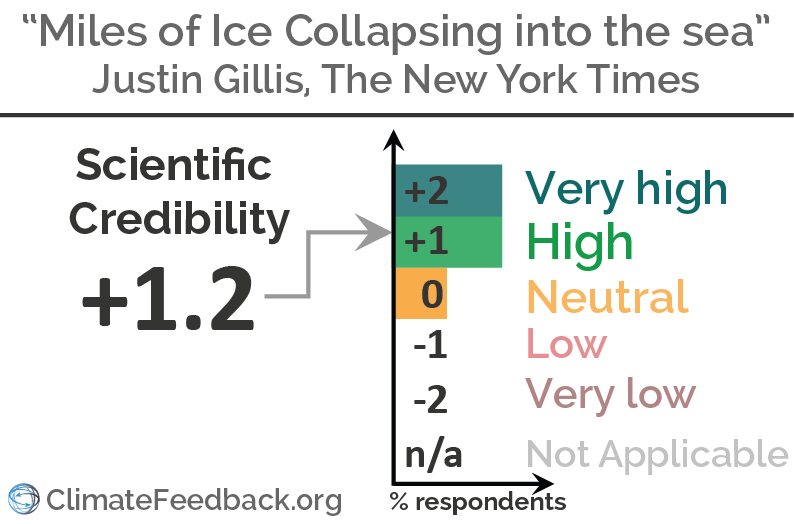
Find more details in the annotations below and in Climate Feedback's analysis
Right now, the shelf works like a giant bottle-stopper that slows down ice trying to flow from the land into the sea. If it collapses, the ice could flow into the ocean more rapidly, an effect that has already happened on a much smaller scale in other areas of Antarctica. The most vulnerable parts of the West Antarctic ice sheet could raise the sea level by 10 to 15 feet, inundating many of the world’s coastal cities, though most scientists think that would take well over a century, or perhaps longer. They are worried about a possible rise of as much as six feet by the end of this century.
The warmer water seems to be doing the most damage to a series of glaciers that flow into a region of West Antarctica called the Amundsen Sea. Satellites have identified the most rapid loss of ice there, raising a critical question: Has an unstoppable collapse of the ice sheet already begun?
But the story is not straightforward, and the warmer water attacking the ice has not been linked to global warming — at least not directly. The winds around the continent seem to be strengthening, stirring the ocean and bringing up a layer of warmer water that has most likely been there for centuries. Are those stronger winds tied to human-caused global warming? Some scientists think so, but others say the case is unproven. “We’re not sure because we don’t have enough data, for long enough, to separate signal from noise,” said Eric J. Steig, a scientist at the University of Washington who has studied temperature trends in Antarctica.
The acceleration is making some scientists fear that Antarctica’s ice sheet may have entered the early stages of an unstoppable disintegration. Because the collapse of vulnerable parts of the ice sheet could raise the sea level dramatically, the continued existence of the world’s great coastal cities — Miami, New York, Shanghai and many more — is tied to Antarctica’s fate.
Already, scientists know enough to be concerned. About 120,000 years ago, before the last ice age, the planet went through a natural warm period, with temperatures similar to those expected in coming decades. The sea level was 20 to 30 feet higher than it is today, implying that the ice sheets in both Greenland and Antarctica must have partly disintegrated, a warning of what could occur in the relatively near future if the heating of the planet continues unchecked.
Though the role of global warming is unclear now, it is likely to be a factor in the relatively near future. Many experts think warmer air temperatures could start to weaken the ice of West Antarctica from above, even as warmer ocean water attacks it from below. The warmer water seems to be doing the most damage to a series of glaciers that flow into a region of West Antarctica called the Amundsen Sea. Satellites have identified the most rapid loss of ice there, raising a critical question: Has an unstoppable collapse of the ice sheet already begun?
But the story is not straightforward, and the warmer water attacking the ice has not been linked to global warming — at least not directly. The winds around the continent seem to be strengthening, stirring the ocean and bringing up a layer of warmer water that has most likely been there for centuries. Are those stronger winds tied to human-caused global warming? Some scientists think so, but others say the case is unproven. “We’re not sure because we don’t have enough data, for long enough, to separate signal from noise,” said Eric J. Steig, a scientist at the University of Washington who has studied temperature trends in Antarctica.
Incorporating recent advances in the understanding of how ice sheets might break apart, they found that both West Antarctica and some vulnerable parts of East Antarctica would go into an unstoppable collapse if the Earth continued to warm at a rapid pace. In their worst-case scenario, the sea level could rise by six feet by the end of this century, and the pace could pick up drastically in the 22nd century. Dr. DeConto and Dr. Pollard do not claim that this is a certainty — they acknowledge that their analysis is still rough — but they argue that the possibility should be taken seriously.
Remote as Antarctica may seem, every person in the world who gets into a car, eats a steak or boards an airplane is contributing to the emissions that put the frozen continent at risk. If those emissions continue unchecked and the world is allowed to heat up enough, scientists have no doubt that large parts of Antarctica will melt into the sea. But they do not know exactly what the trigger temperature might be, or whether the recent acceleration of the ice means that Earth has already reached it.
Recent computer forecasts suggest that if greenhouse gas emissions continue at a high level, parts of Antarctica could break up rapidly, causing the ocean to rise six feet or more by the end of this century. That is double the maximum increase that an international climate panel projected only four years ago. But those computer forecasts were described as crude even by the researchers who created them. “We could be decades too fast, or decades too slow,” said one of them, Robert M. DeConto of the University of Massachusetts, Amherst. “There are still some really big question marks about the trajectory of future climate around Antarctica.”
The acceleration is making some scientists fear that Antarctica’s ice sheet may have entered the early stages of an unstoppable disintegration. Because the collapse of vulnerable parts of the ice sheet could raise the sea level dramatically, the continued existence of the world’s great coastal cities — Miami, New York, Shanghai and many more — is tied to Antarctica’s fate.
The ‘ancient carbon’ of Alaska’s tundras is being released, starting a vicious warming cycle
Overall scientific credibility: 'neutral', according to 3 scientists who analyzed this article.
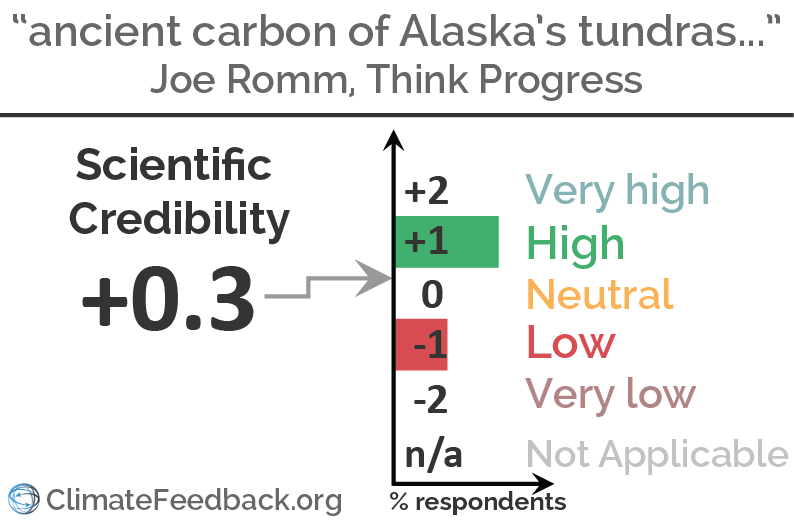
Find more details in the annotations below and in Climate Feedback's analysis
“Because it’s getting warmer, there’s more CO2 coming out which means it’s going to get warmer which means there’s more CO2 coming out,” explained Harvard researcher and lead author Roisin Commane. “And it will just run away with itself.”
Róisín Commane, Research Associate, Harvard School of Engineering & Applied Sciences:
"I spoke with Henry Fountain (New York Times), Chris Mooney (Washington Post), Oli Milman (Guardian) and Bob Berwyn (Inside Climate News) about the PNAS paper and I think they all did a great job condensing my attempts at communicating the message of the paper. The radio chat I did with a local NPR station in Juneau, AK (which I think is the source of this article) was probably the least comprehensive attempt - I tried to make things as simple as possible and didn't realize that the quote would sound so off when taken outside of that context. I think the written articles better conveyed the essence of the paper compared to what I tried to say in the radio piece."
Global Quackery: Earth Has Not Warmed For Past 19 Years, New Study Finds
Overall scientific credibility: 'very low', according to scientists who analyzed this article.
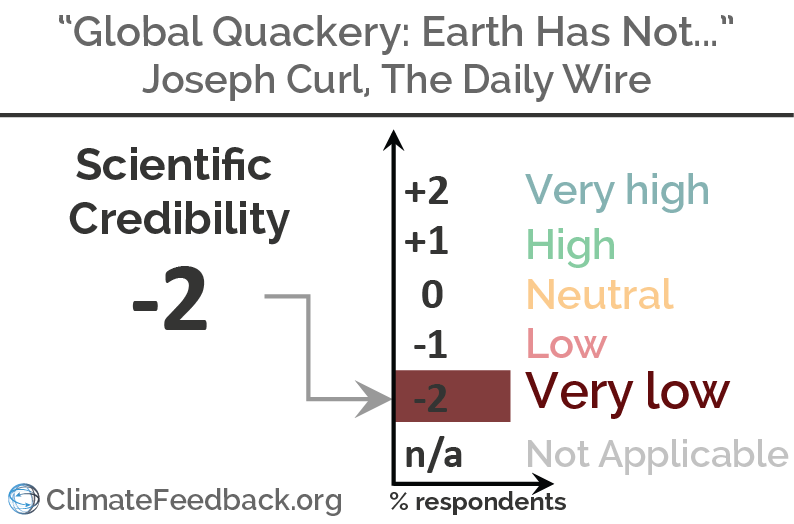
Find more details in the annotations below and in Climate Feedback's analysis
Scientists are also expecting a “huge reduction” in solar activity for 33 years between 2020 and 2053 that will cause thermometers to crash.
this argument has previously been commented on in this Climate Feedback review: http://climatefeedback.org/evaluation/the-telegraph-dan-hyde-earth-heading-for-mini-ice-age-within-15-years/
"Experts told Daily Star Online planet Earth is on course for a “Little Age Ice” within the next three years thanks to a cocktail of climate change and low solar activity," the Brit paper writes on Monday.
The following is extracted from this tabloid article.
Another Arctic ice panic over as world temperatures plummet
Overall scientific credibility: 'very low', according to 7 scientists who analyzed this article.
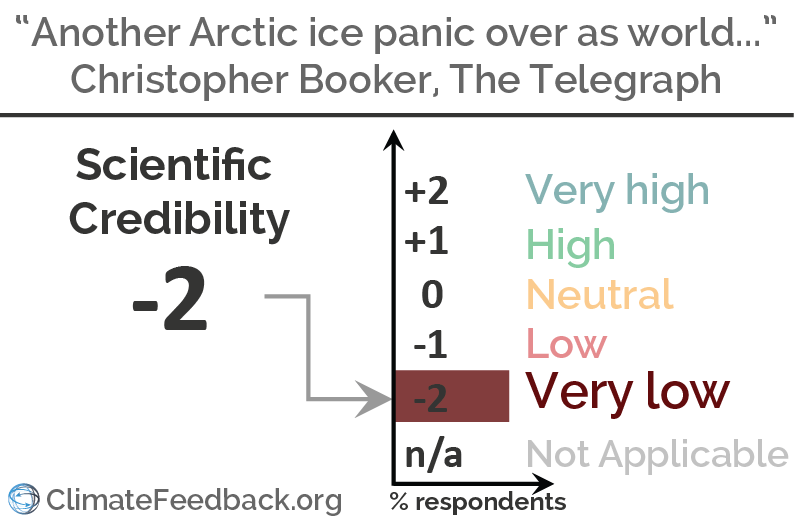
Find more details in the annotations below and in Climate Feedback's analysis
as charted by our friend Paul Homewood on his blog Notalotofpeopleknowthat, with the news
refers to this blog post
As for those record temperatures brought in 2016 by an exceptionally strong El Niño, the satellites now show that in recent months global temperatures have plummeted by more that 0.6 degrees: just as happened 17 years ago after a similarly strong El Niño had also made 1998 the “hottest year on record”.
this argument has largely been commented on in this Climate Feedback review: http://climatefeedback.org/evaluation/stunning-new-data-indicates-el-nino-drove-record-highs-global-temperatures-david-rose-daily-mail/
FAQ 13.1 | Why Does Local Sea Level Change Differ from the Global Average?
Scientists analyzed this claim and concluded it is Incorrect:

Find more details in Climate Feedback's analysis of this article
How a Melting Arctic Changes Everything
Overall scientific credibility: 'very high', according to 5 scientists who analyzed this article.
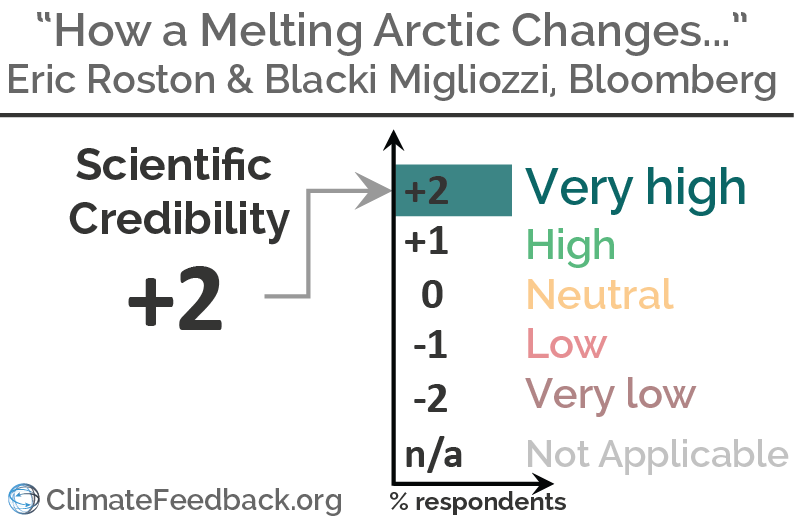
Find more details in the annotations below and in Climate Feedback's analysis
From extreme drought to record rain: Why California's drought-to-deluge cycle is getting worse
Overall scientific credibility: 'high', according to 4 scientists who analyzed this article.
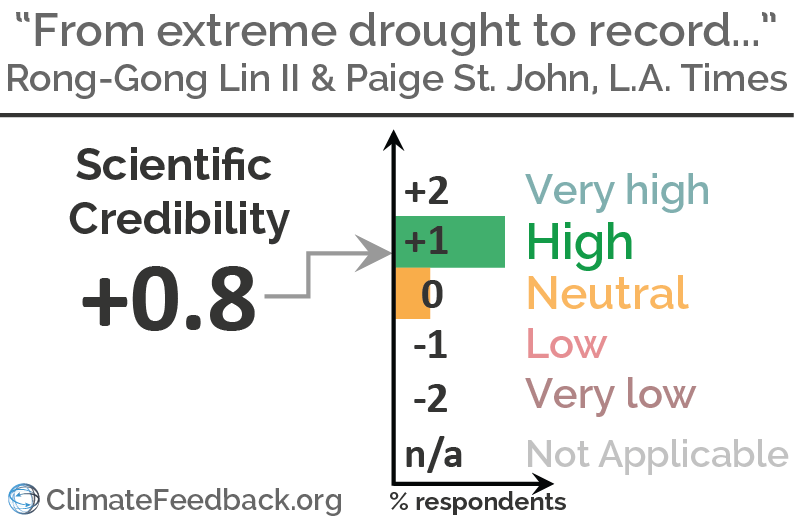
Find more details in the annotations below and in Climate Feedback's analysis
It’s been warming for hundreds of years! And we can’t explain all of that, you know, due to human causes.
Valerie Trouet, Associate Professor, University of Arizona:
The first sentence is a very general statement (what is “it”?), but I’m assuming Dr. Curry means Northern Hemisphere, Southern Hemisphere, or global average temperatures. None of these have been warming for hundreds of years, as she claims, but the available proxy data show a warming since approximately 1850 (see Fig. 5.7 in IPCC AR5 and Fig. 4b in PAGES2Kconsortium, 2013*, below). These results are based on paleoclimate data, not on models.
As to Dr. Curry’s 2nd statement, no one claims that all past warming is due to human causes. More important, however, is that the warming since 1850 cannot be explained by natural climate variability alone, without human causes. Only by including anthropogenic CO2 emissions as a forcing (in addition to the other external forcings) can models replicate the recent warming that is shown in the data.
“It is an empirical fact that the Earth’s climate has warmed overall for at least the past century. However, we do not know how much humans have contributed to this warming and there is disagreement among scientists as to whether human-caused emissions of greenhouse gases is the dominant cause of recent warming, relative to natural causes”
Gavin Schmidt, Director, NASA Goddard Institute for Space Studies:
There is indeed overwhelming evidence for warming in the last century. Curry’s claim that no one knows the attribution of this to human impacts is not a valid description of the state of knowledge. There are indeed plenty of studies that use statistical or model-based fingerprints to assess this and they overwhelmingly find a dominance of human activities over natural forcings or internal variability. For the more recent period (1950 onwards) the claims are even stronger—that effectively all the warming is caused by human activity with only a ~10% uncertainty due to internal variability. One can always find something to disagree with in such a statement, but disagreement in the absence of any quantitative result to the contrary is not worth much. Curiously, the paper* that Curry cites to claim a low sensitivity assumes that all the warming is human caused.
“Current global climate models are not fit for the purpose of attributing the causes of recent warming or for predicting global or regional climate change on timescales of decades to centuries, with any high level of confidence.
Reto Knutti, Professor, ETH Zürich:
This statement is at odds with just about every detection and attribution study, every climate model, and basic physical principles of the global energy budget. The trend in natural forcing (solar and volcanic) from about 1950-2000 is nearly zero and can therefore not explain the observed warming. Natural variability is much smaller than the observed warming. In a recent study* we showed that “even if models were found to underestimate internal variability by a factor of three, it is extremely unlikely that internal variability could produce a trend as large as observed.” This leaves anthropogenic forcings as the main drivers, and we understand why: it is the physics of the greenhouse effect, which have been known for more than a century.
In terms of projections, confidence is high for large scale temperature trends, ocean acidification, or sea level rise over multiple decades, but of course lower for other local impact-relevant quantities. But the fact is that even projections made decades ago with much simpler models were remarkably accurate*.
As Kevin Trenberth and I argued in a recent post, an important question to me is whether as a society we are better off with imperfect predictions than with no predictions at all. If we absolutely want to go down a potentially likely path, it would be smarter to have an imperfect map than no map at all.
“There is little scientific basis in support of claims that extreme weather events – specifically, hurricanes, floods, drought, tornadoes – and their economic damage have increased in recent decades due to the emission of greenhouse gases. In fact, since 2013 the world and the United States have had a remarkable stretch of good fortune with respect to extreme weather, as compared to the past.”
James Elsner, Professor, Florida State University:
While there is little scientific evidence that there will be more (or fewer) hurricanes or more hurricanes hitting the U.S., there is strong theoretical and statistical evidence that the strongest hurricanes are getting stronger as the oceans heat up due to global warming from the emission of greenhouse gases. In fact, there is statistical evidence that the magnitude of economic damage in the U.S. from hurricanes increases with rising ocean temperature.
“There is little scientific basis in support of claims that extreme weather events – specifically, hurricanes, floods, drought, tornadoes – and their economic damage have increased in recent decades due to the emission of greenhouse gases. In fact, since 2013 the world and the United States have had a remarkable stretch of good fortune with respect to extreme weather, as compared to the past.”
Kerry Emanuel, Professor of Atmospheric Science, MIT:
Most of the published scientific work concerns the expected response of tropical cyclones to climate change and anticipates that such storms will become stronger and perhaps less frequent, but at a rate that should not be formally detectable until mid-century. Yet there is clear satellite-based evidence (e.g. Elsner et al., Nature, 2008; Kossin et al. J. Climate, 2013)* of increasing incidence of the strongest storms, as theory dating back to 1987 predicted.
south Florida are experiencing regular episodes of water in the streets.
Overall scientific credibility: 'very high', according to 4 scientists who analyzed this article.
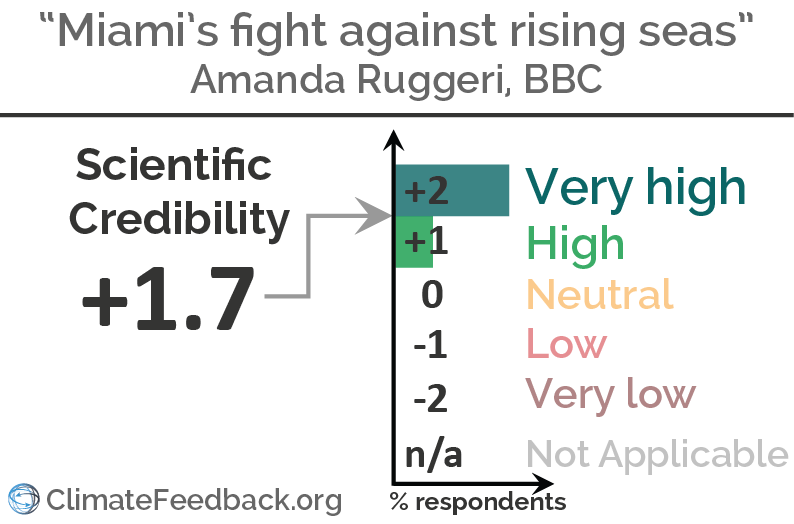
Find more details in the annotations below and in Climate Feedback's analysis
One graph compiled in 2015 by the Southeast Florida Regional Climate Change Compact
graph:

This oft-used range of estimates puts a 6-10in rise by 2030 as a likely scenario (Credit: Southeast Florida Regional Climate Change Compact)
current globalclimate models are not fit for the purpose of attributing the causes of recentwarming or for predicting global or regional climate change on timescales of decades to centuries, with any high level of confidence.
Itis an empirical fact that the Earth’s climate has warmed overall for at least the past century.However, we do not know how much humans have contributed to this warming and there is disagreement among scientists as to whether human-caused emissionsof greenhouse gasesisthe dominant cause ofrecentwarming, relative to natural causes.
One of the most troubling ideas about climate change just found new evidence in its favor
Overall scientific credibility: 'high', according to 6 scientists who analyzed this article.
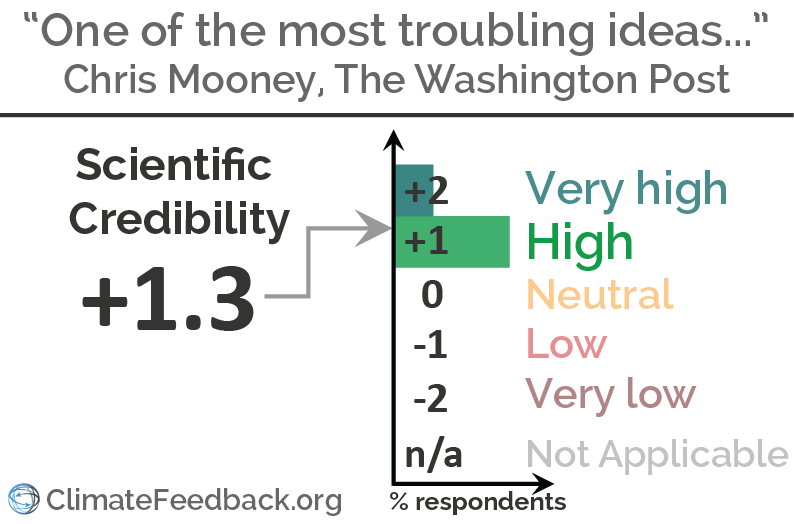
Find more details in the annotations below and in Climate Feedback's analysis
Record-breaking climate change pushes world into ‘uncharted territory’
Overall scientific credibility: 'high' to 'very high', according to 8 scientists who analyzed this article.
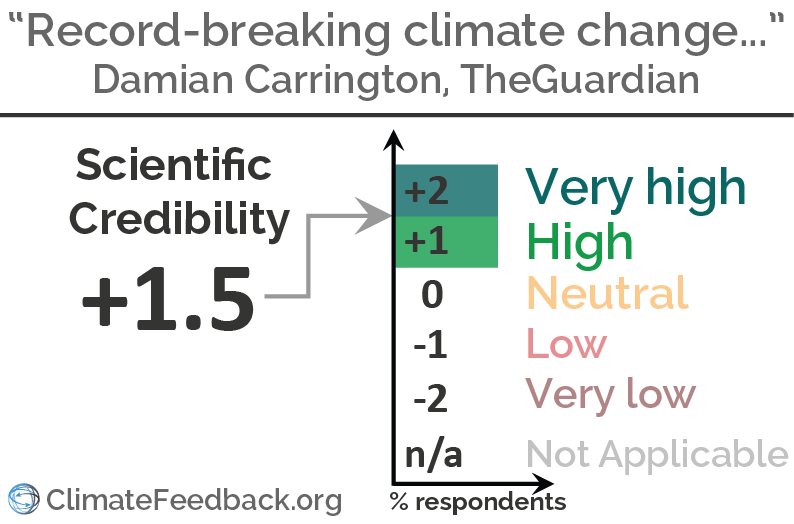
Find more details in the annotations below and in Climate Feedback's analysis
Large Sections of Australia’s Great Reef Are Now Dead, Scientists Find
Overall scientific credibility: 'very high', according to 4 scientists who analyzed this article.
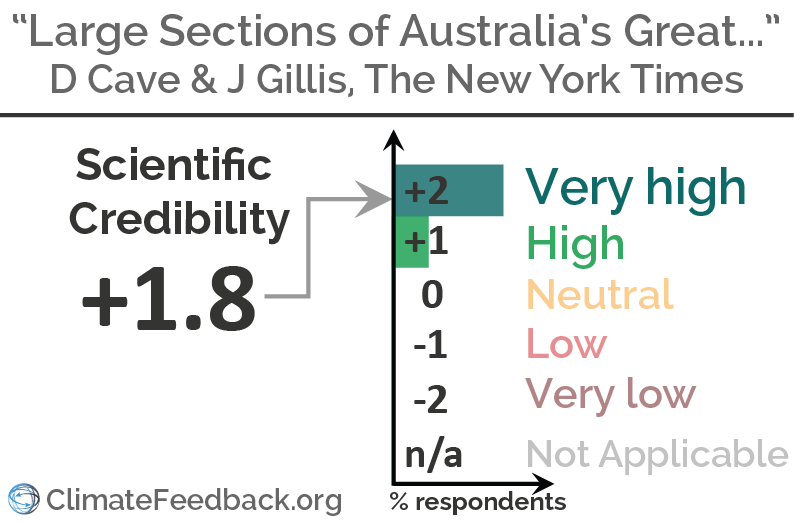
Find more details in the annotations below and in Climate Feedback's analysis
Within a decade, certain kinds of branching and plate coral could be extinct, reef scientists say, along with a variety of small fish that rely on them for protection from predators.
John Bruno, Professor, The University of North Carolina at Chapel Hill:
I think it is very unlikely any corals would be extinct in a decade. The problem isn't threat of extinction, its loss of habitat for other critters when corals bleach and die. The corals become less dense, but there will still be many millions of colonies for most species.
If water temperatures stay moderate, the damaged sections of the Great Barrier Reef may be covered with corals again in as few as 10 or 15 years.
John Bruno, Professor, The University of North Carolina at Chapel Hill:
First, they aren't moderate now. If they were to decrease and not exceed the bleaching threshold for another few decades, there would be some coral recovery. Second, 10-15 years is a big stretch. There would be some recovery, but not total recovery, especially of very long-lived slow-growing species.
An additional kick was supplied by an El Niño weather pattern that peaked in 2016 and temporarily warmed much of the surface of the planet, causing the hottest year in a historical record dating to 1880.
John Bruno, Professor, The University of North Carolina at Chapel Hill:
This is a very common misconception even among scientists. The warming, bleaching, and coral loss is 100% due to greenhouse gas emissions not the ENSO cycle and the fact this we were in a peak of the El Nino phase in early 2016. The GBR has experienced El Nino events for thousands of years, yet bleaching wasn't observed there until 1998 when ocean warming pushed ocean temperatures just above the bleaching threshold.
Why are climate-change models so flawed? Because climate science is so incomplete
Overall scientific credibility: 'very low', according to 9 scientists who analyzed this article.
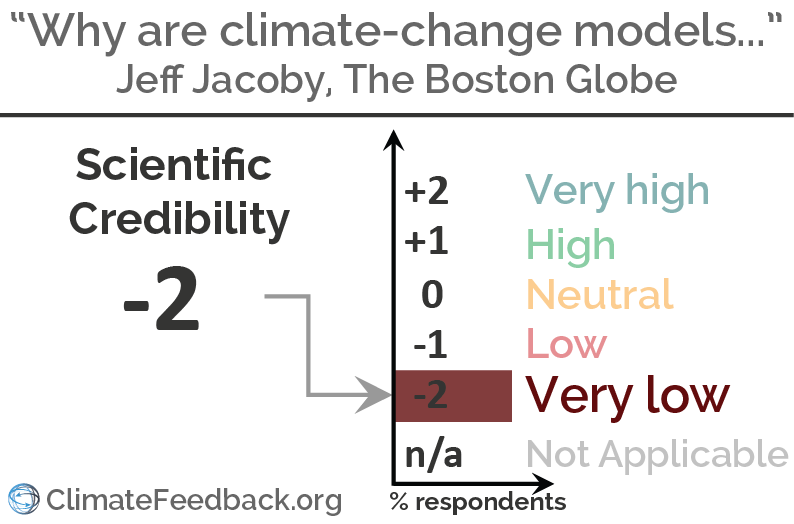
Find more details in the annotations below and in Climate Feedback's analysis
more than 100 per cent of the warming over the past century is due to human actions. How can it be more than 100 per cent? Because without us the planet would likely have cooled very slightly thanks to natural factors such as volcanic emissions and orbital changes.
Scientists analyzed this claim and conclude it is largely consistent with the science:

Find more details in Climate Feedback's analysis of this article
carbon dioxide is not a primary contributor to global warming
Scientists analyzed this claim and conclude it is completely inconsistent with the science:

Find more details in Climate Feedback's analysis of this article
Earth heading for 'mini ice age' within 15 years
Overall scientific credibility: 'low' to 'very low', according to the 6 scientists who analyzed this article.
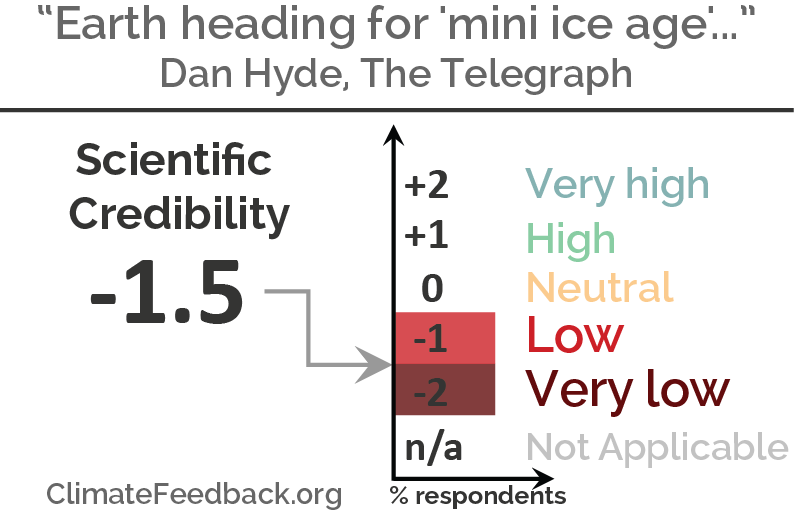
Find more details in the reply+annotations below and in Climate Feedback's analysis
Scientists: Here's What Really Causes Climate Change (And It Has Nothing To Do With Human Beings)
Overall scientific credibility: 'low' to 'very low', according to 4 scientists who analyzed this article.
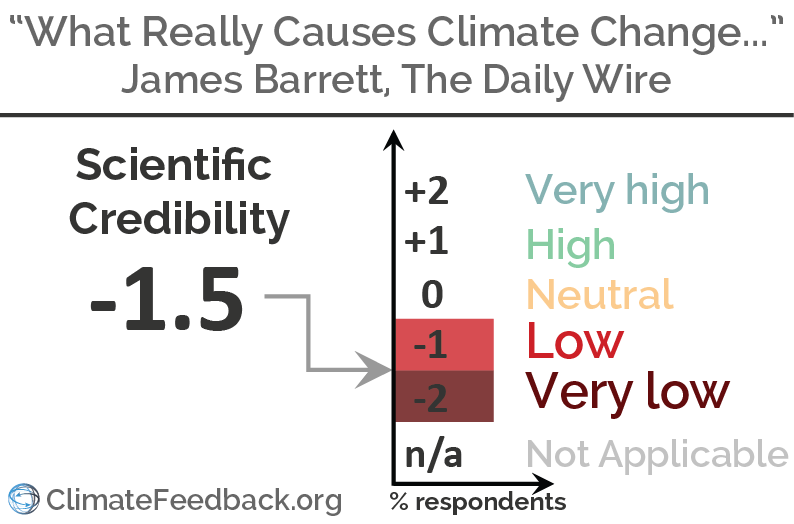
Find more details in the annotations below and in Climate Feedback's analysis
Here’s why it's so frickin’ hot right now window.variationsTitleElem = $('article header h1.title');
Overall scientific credibility: 'high', according to 3 scientists who analyzed this article.
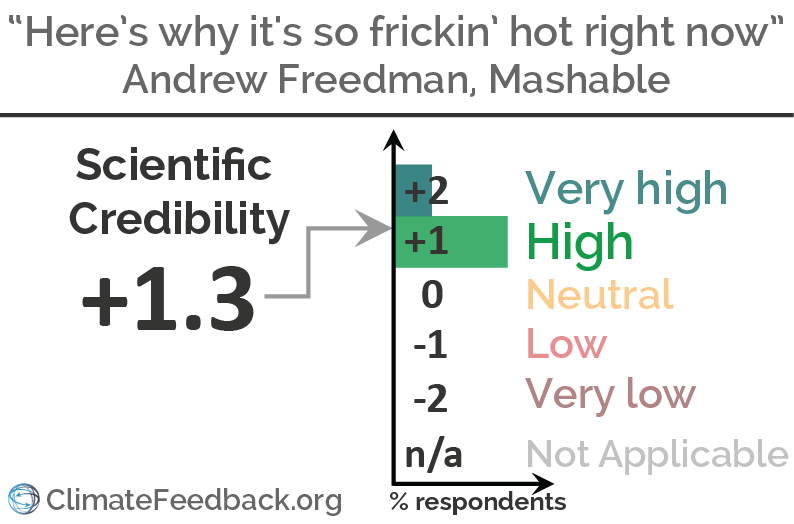
Find more details in the annotations below and in Climate Feedback's analysis
only 10 pc of coral reefs can be saved from extinction
Scientists analyzed this claim and conclude it is largely consistent with the science:

Find more details in Climate Feedback's analysis of this article
The Alarming Thing About Climate Alarmism
Overall scientific credibility: 'very low' to 'low', according to 7 climate scientists who evaluated this article.

Find more details in the annotations below and on ClimateFeedback.org
This evaluation features contributions by MIT Prof. Kerry Emanuel (see annotations below) and by Wesleyan University Prof. Gary Yohe (see his comments on the article)
karmour:
The article contains numerous scientific errors, does not provide references for some of its key claims, and ignores much of the published literature on the subjects discussed. It appears that many details have been cherry-picked or misconstrued in service of making a political point.
anonymous reviewer:
The author tries to rebut the narrative "that the world’s climate is changing from bad to worse". In doing so, he erects a straw-man, cherry-picks studies and misrepresents current climate science. Furthermore, the logic that since things are not 'worst-than-we-thought', we shouldn't take action and do the things we would do if things were simply 'bad', is lost on me…
emvincent:
The article is imprecise, for instance, about who the “doomsayers” and the “alarmists” are: since the core of the argumentation is about them, a definition of who they are and what they argue exactly cannot be avoided. It is also vague in its conclusion: “we need balance”, here again what exactly is meant by balance should be made clearer.
jgdwyer:
Tries and fails to make a convincing case for why humans need to worry about climate change less than they currently do.
bmv:
Although this author appears to have read parts of the IPCC report and carefully selected the facts which support his narrative, he presents information in a very misleading way, and some of his statements (e.g. "despite endless successions of climate summits, carbon emissions continue to rise") do not support his thesis that action on climate change is alarmist and unnecessary. His conclusion that "climate change is not worse than we thought. Some indicators are worse, but some are better" suggests a false equivalency between the indicators that are "worse" and those that are "better".
drchavas:
The author on multiple occasions presents blatantly inaccurate information and otherwise uses selective information to argue his point, which is highly misleading.
El Niño, explained: Why this year's could be one of the strongest on record
Overall scientific credibility: 'very high' to 'high', according to 5 scientists who analyzed this article.
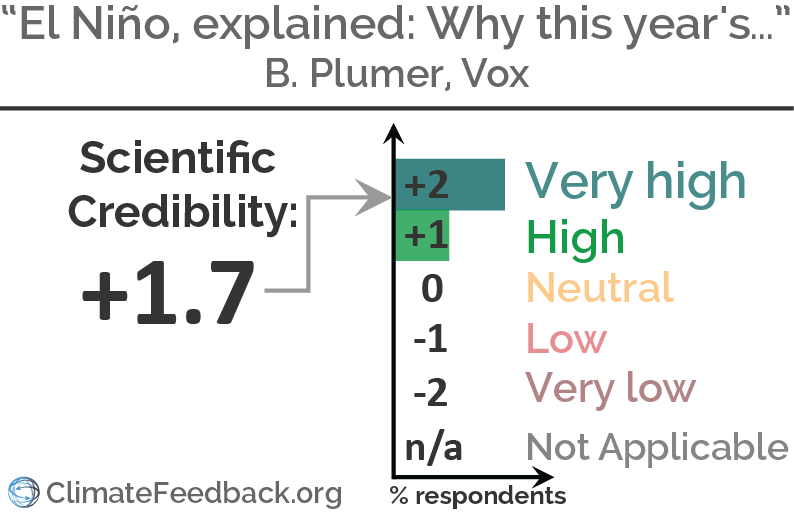
Find more details in the reply+annotations below and in Climate Feedback's analysis
Scientists have just detected a major change to the Earth’s oceans linked to a warming climate The inside track on Washington politics. Be the first to know about new stories from PowerPost. Sign up to follow, and we’ll e-mail you free updates as they’re published. You’ll receive free e-mail news updates each time a new story is published. You’re all set! Sign up *Invalid email address Got it Got it
Overall scientific credibility: 'very high', according to 6 scientists who analyzed this article.
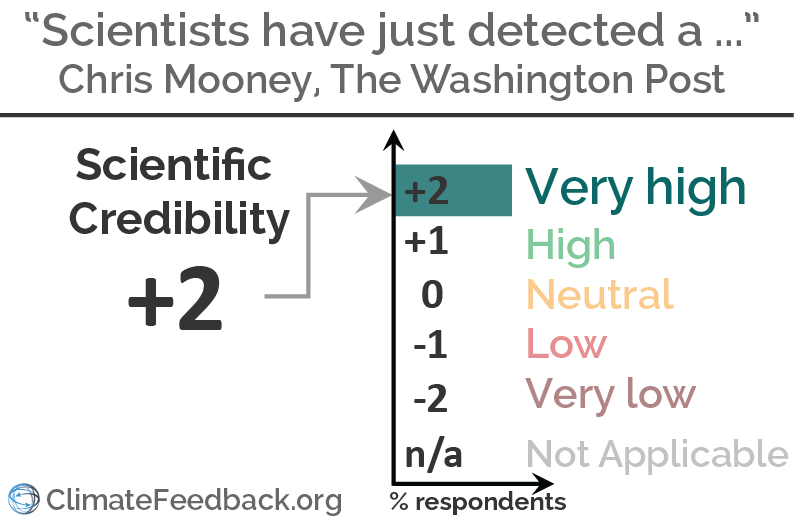
Find more details in the annotations below and in Climate Feedback's analysis
What California’s Dam Crisis Says About the Changing Climate
Overall scientific credibility: 'high', according to 3 scientists who analyzed this article.
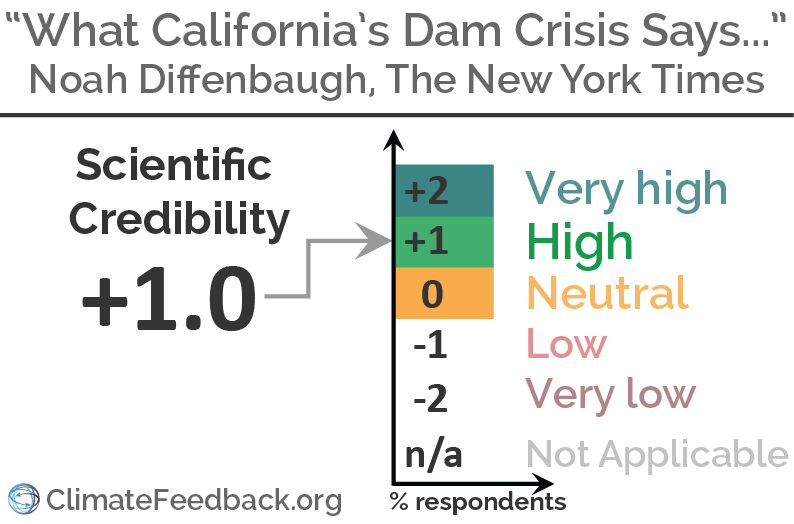
Find more details in the annotations below and in Climate Feedback's analysis
The big melt: Global sea ice at record low
Overall scientific credibility: 'high', according to 5 scientists who analyzed this article.
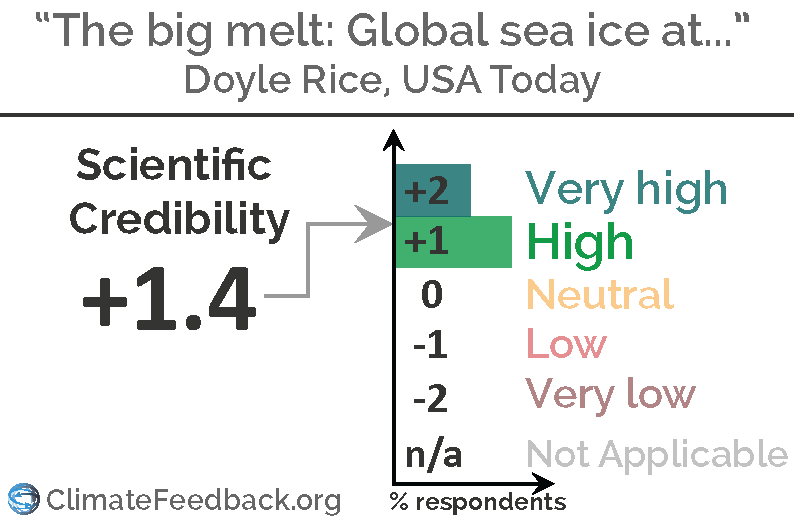
Find more details in the annotations below and in Climate Feedback's analysis
Dr John Bates’s disclosures about the manipulation of data
Update: Dr Bates contradicts The Daily Mail allegations of fraud:
"The issue here is not an issue of tampering with data, but rather really of timing of a release of a paper that had not properly disclosed everything it was," he said.
world leaders were duped into investing billions over manipulated global warming data
4 scientists analyzed this article and show its conclusions are unsupported

Find more details in Climate Feedback's analysis of this article
How Do We Know the World Has Warmed?
U.S. scientists officially declare 2016 the hottest year on record. That makes three in a row. The inside track on Washington politics. Be the first to know about new stories from PowerPost. Sign up to follow, and we’ll e-mail you free updates as they’re published. You’ll receive free e-mail news updates each time a new story is published. You’re all set! Sign up *Invalid email address Got it Got it
Overall scientific credibility: 'very high', according to 12 scientists who analyzed this article.
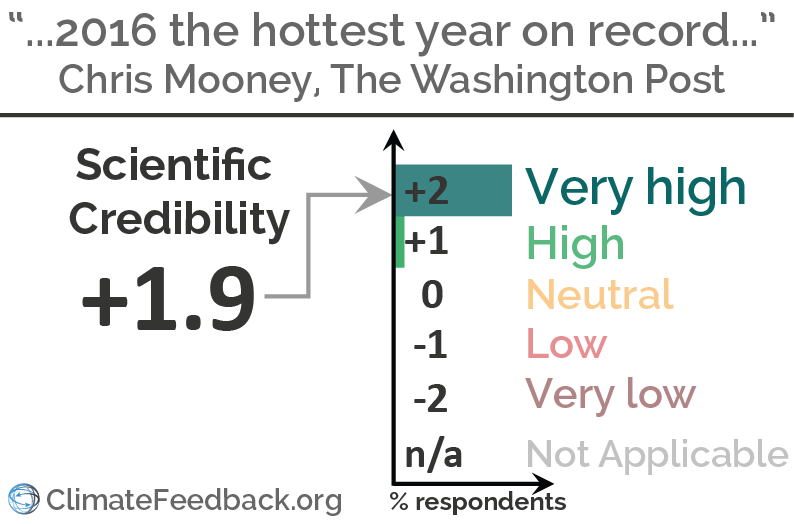
Find more details in the annotations below and in Climate Feedback's analysis
Ocean acidification: yet another wobbly pillar of climate alarmism
Overall scientific credibility: 'very low', according to 6 scientists who analyzed this article.
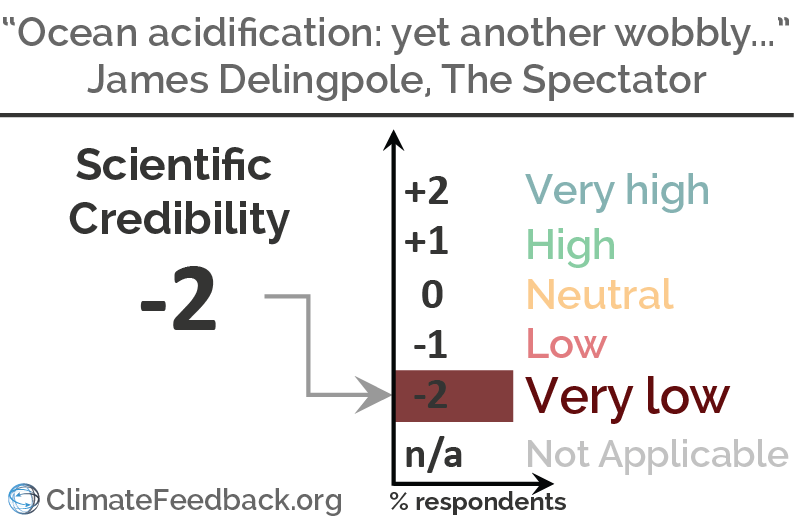
Find more details in the annotations below and in Climate Feedback's analysis
There was, he said, an ‘inherent bias’ in scientific journals which predisposed them to publish ‘doom and gloom stories’.
Howard Browman, Principal Research Scientist, Norwegian Institute of Marine Research:
The words "inherent bias" do not appear in my article. Rather, I refer to "publication bias". In research, an "inherent bias" is one which is inextricably tied to the core nature of the phenomenon being studied and cannot, therefore, be eliminated by increasing the sample size or choosing a different estimator. "Publication bias", on the other hand, refers to the general (across all of science) phenomenon by which studies presenting positive results - supporting the hypothesis being tested - are more likely to be published than those reporting negative results. This sometimes creates a situation where published studies may be systematically different from unpublished studies - for example, studies showing an impact of ocean acidification might be published more easily and in higher profile journals than studies showing no impact. However, I only allude to this possibility in the introduction; I do not assess it quantitatively (something that would, in fact, be very difficult to do). Finally, the words "doom and gloom" do not appear in my introduction.
The impact on calcification, metabolism, growth, fertility and survival of calcifying marine species when pH is lowered up to 0.3 units (beyond what is considered a plausible reduction this century) is beneficial, not damaging. Marine life has nothing whatsoever to fear from ocean acidification.
Ken Caldeira, Senior Scientist, Carnegie Institution for Science:
There is much evidence available to falsify this statement. Many experiments have shown substantial negative biological responses at these levels of pH change. Of course, some organisms are relatively unaffected by these levels.
An older review that is available here without a paywall: http://people.uncw.edu/szmanta/2007%20Bio%20585%20pdfs/Langdon%202000%20(Review-CO%5E2%20&%20Calcification).pdf
First, marine species that calcify have survived through millions of years when CO2 was at much higher levels; second, they are more than capable of adapting — even in the short term — to environmental change; third, seawater has a large buffering capacity which prevents dramatic shifts in pH; fourth, if oceans do become warmer due to ‘climate change’, the effect will be for them to ‘outgas’ CO2, not absorb more of it.
Ken Caldeira, Senior Scientist, Carnegie Institution for Science:
Many marine organisms respond to changes in calcium carbonate mineral saturation states. These depend not only on pH, but also on factors including amounts of carbon and calcium in the ocean. One of the most important factors is ocean alkalinity, which varies on time scale of many thousands of years. In the geologic past, when atmospheric CO2 was high, ocean alkalinity was also high, and so carbonate mineral saturation states could remain high.
Unfortunately, on the timescale of centuries or decades, changes come to fast for the ocean's natural processes to buffer ocean carbonate mineral saturation states.
Directlly comparing effects of high co2 levels that developed in the geologic past over many millions of years with high co2 levels developing today over decades and centuries shows a fundamental lack of understanding of well-established global geochemical cycles. This open access article explains some of the relevant chemistry: http://onlinelibrary.wiley.com/doi/10.1002/2015JC011364/full
there has been no reduction in oceanic pH levels in the last -century.
Ken Caldeira, Senior Scientist, Carnegie Institution for Science:
This statement just flies in both the face of observational facts and a basic understanding of chemistry. I would love to hear a cogent explanation of how atmospheric CO2 levels could rise over the course of a century without producing a decrease in ocean pH.
Observations near Hawaii and several other open ocean environments show clear decreasing trends in ocean pH. See, for example, http://www.eea.europa.eu/data-and-maps/indicators/ocean-acidification/assessment
It is one thing to challenge future projections, but rejecting well-established scientific facts is another thing entirely.
Figure: Decline in pH measured at the Aloha station as part of the Hawaii Ocean time-series. Source
The impact on calcification, metabolism, growth, fertility and survival of calcifying marine species when pH is lowered up to 0.3 units (beyond what is considered a plausible reduction this century) is beneficial, not damaging. Marine life has nothing whatsoever to fear from ocean acidification.
Richard Feely, Senior Scientist, NOAA's Pacific Marine Environmental Laboratory:
The Idso meta-analysis described by Delingpole was never published. It does not take into account the proper method of proportional scaling analysis. It does not demonstrate how negative effects will impact ecosystem services and food-web processes that can have an affect on economically import fish and shellfish. It does not address the impacts we are already seeing on important fish food, such as pteropods (see Bednarsek et al., 2012, 2014; Feely et al., 2016). There are several highly credible published meta-analysis studies (Kroeker et al. ,2013; Wittman & Pörtner, 2013; and Busch and McElhany, 2016, that have told a much different story than Idso's unpublished work. Delingpole failed to even mention these other studies, which show very significant impacts on several marine taxa. In summary, the Delingpole’s article demonstrates a complete lack of appreciation of scientific literature on this topic and the proper choice of scientific methods for data analysis and synthesis that leads to a more accurate understanding of the present-day and future impacts of ocean acidification.
When Wallace plotted a chart of his own, incorporating all the available data, covering the period from 1910 to the present, his results were surprising: there has been no reduction in oceanic pH levels in the last -century.
Richard Feely, Senior Scientist, NOAA's Pacific Marine Environmental Laboratory:
Michael Wallace contacted Chris Sabine and myself several years ago and asked how to get access to historical pH measurements in the oceans so he could determine long-term trends of global ocean pH for himself. We directed him to both modern (as published in Feely et al., 2008) and historical pH measurements archived at the NOAA National Centers for Environmental Information (https://www.ncei.noaa.gov) formerly called the National Oceanographic Data Center (NODC). We cautioned him that the earlier data sets prior to 1989 had significant issues with data quality as described in the document that went along with the data set was obtained from NCEI. Mr. Wallace went on to perform his analysis of the historical data without regard for the oceanographic community's concerns about the data quality or for the proper methodology to perform this kind of analysis. He chose to publish his results within the context of an interview written by Marita Noon in the Farmington Daily Times. This was quickly picked up by a number of authors who republished those results in a number of internet blogs including several blogs by James Delingpole, Anthony Watts and Thomas Lifson. We responded by correcting the record by formally restating our concerns about Mr. Wallace's incorrect use of the historical data on our internet website (http://www.pmel.noaa.gov/co2/story/Quality+of+pH+Measurements+in+the+NODC+Data+Archives). In short, Wallace's chart does not show any kind of useful trend in global ocean pH because the data he used, and how he used them, were not appropriate for this kind of analysis. In the first place, the pH measurements prior to 1989 were not reliable enough to detect small pH changes over that period. In addition, companion meta data on sensor calibration, pH scales and temperature corrections were not available. Finally, the data were so limited that no meaningful global averages could be determined. The article by Mr Delingpole in the Spectator failed to address these important issues, as Philip Williamson correctly points out in his response to the article.
Howard Browman, a marine scientist for 35 years, has published a review in the ICES Journal of Marine Science of all the papers published on the subject. His verdict could hardly be more damning. The methodology used by the studies was often flawed; contrary studies suggesting that ocean acidification wasn’t a threat had sometimes had difficulty finding a publisher. There was, he said, an ‘inherent bias’ in scientific journals which predisposed them to publish ‘doom and gloom stories’.
Howard Browman, Principal Research Scientist, Norwegian Institute of Marine Research:
The following decomposition of this excerpt from Mr. Delingpole's article in The Spectator identifies inaccuracies in reporting that lead to misrepresentation of the content and intent of my article. Importantly, Mr. Delingpole never contacted me to verify that his reporting on my article was accurate. Nor was I contacted by the UK's Independent Press Standards Organisation during their investigation of the accuracy of Mr. Delingpole's article in The Spectator.
Howard Browman, a marine scientist for 35 years, has published a review in the ICES Journal of Marine Science of all the papers published on the subject.
Howard Browman, Principal Research Scientist, Norwegian Institute of Marine Research:
The article that Mr. Delingpole is referring to is not "a review", but an introduction to a special theme issue on the topic of ocean acidification. The word "Introduction" appears in bold-type immediately above the title. The introduction does not review all of the nearly 4000 articles on the subject. Rather, it presents an overview of the sub-set of research dealing with biological/ecological effects of ocean acidification.
His verdict could hardly be more damning.
Howard Browman, Principal Research Scientist, Norwegian Institute of Marine Research:
On p. 530 of the introduction, I state: "Although I call for a more sceptical scrutiny and balanced interpretation of the body of research on OA, it must be emphasized that OA is happening and it will have effects on some marine organisms and ecosystem processes." Readers can decide for themselves whether this can be interpreted as a verdict that "...could hardly be more damning."
The methodology used by the studies was often flawed;
Howard Browman, Principal Research Scientist, Norwegian Institute of Marine Research:
My introduction does not present a quantitative assessment of the frequency of occurrence of methodological flaws in the ocean acidification literature.
Arctic ice melt 'already affecting weather patterns where you live right now'
Overall scientific credibility: 'neutral' to 'high', according to 6 scientists who analyzed this article.
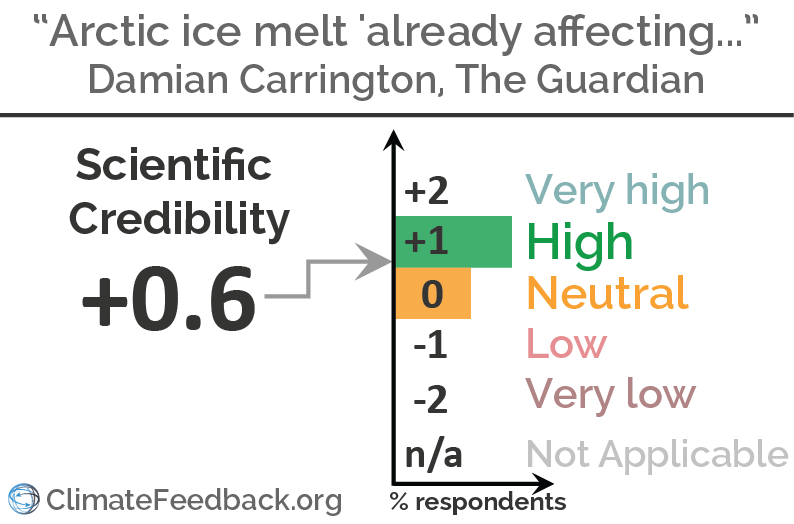
Find more details in the annotations below and in Climate Feedback's analysis
Another consequence of the fast melting Arctic raises the possibility that there may be even worse extreme weather to come, according to a few scientists: titanic Atlantic superstorms and hurricanes barreling across Europe.
Daniel Swain, Postdoctoral Fellow, University of California, Los Angeles:
"This statement does not accurately describe an outcome that is widely supported in the scientific literature. It is certainly true that Arctic sea ice is decreasing at a rapid rate, and that further sea ice loss is highly likely in the future. It is also plausible, and supported by existing research, that present and future sea ice loss may alter the atmospheric circulation in ways that affect the likelihood of certain kinds of weather events*. But the claim regarding "Atlantic superstorms" and "hurricanes barreling across Europe" seems fairly hyperbolic."
The jet stream forms a boundary between the cold north and the warmer south, but the lower temperature difference means the winds are now weaker. This means the jet stream meanders more, with big loops bringing warm air to the frozen north and cold air into warmer southern climes.
Daniel Swain, Postdoctoral Fellow, University of California, Los Angeles:
"The statement regarding what the jet stream is (a "boundary between cold north and warmer south") is essentially correct, and there is indeed evidence that the north-south temperature difference has decreased in some regions.[1] But there remains considerable scientific uncertainty regarding whether the jet stream is actually "meandering more" in a general sense, and whether these large jet stream meanders are actually caused by sea ice loss.[2-3]"
Severe “snowmageddon” winters are now strongly linked to soaring polar temperatures, say researchers, with deadly summer heatwaves and torrential floods also probably linked.
Daniel Swain, Postdoctoral Fellow, University of California, Los Angeles:
"Arctic temperatures have certainly been much higher than the long-term average in recent years, and the extreme warm anomalies this autumn and early winter have been particularly noteworthy. Further, there is a growing body of evidence linking Arctic sea ice loss and/or polar-amplified atmospheric warming to changes in mid-latitude atmospheric circulation*. However, this subject represents a very active area of research and there remains genuine scientific uncertainty regarding specific linkages between ongoing Arctic sea ice loss and specific kinds of extreme weather (like the heatwaves, floods, and snowstorms mentioned here). Moreover, the effects under consideration would likely have different regional manifestations. Therefore, the above statement overstates scientific confidence in such linkages and is overly broad in a geographic sense."
Australia’s Great Barrier Reef has worst coral die-off ever
Overall scientific credibility: 'high' to 'very high', according to 5 scientists who analyzed this article.
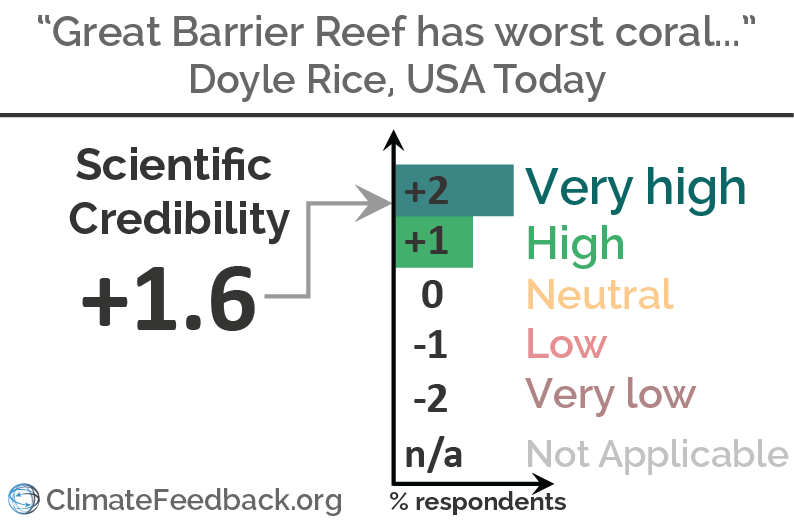
Find more details in the annotations below and in Climate Feedback's analysis
Stunning new data indicates El Nino drove record highs in global temperatures suggesting rise may not be down to man-made emissions
Overall scientific credibility: 'very low', according to 7 scientists who analyzed this article.
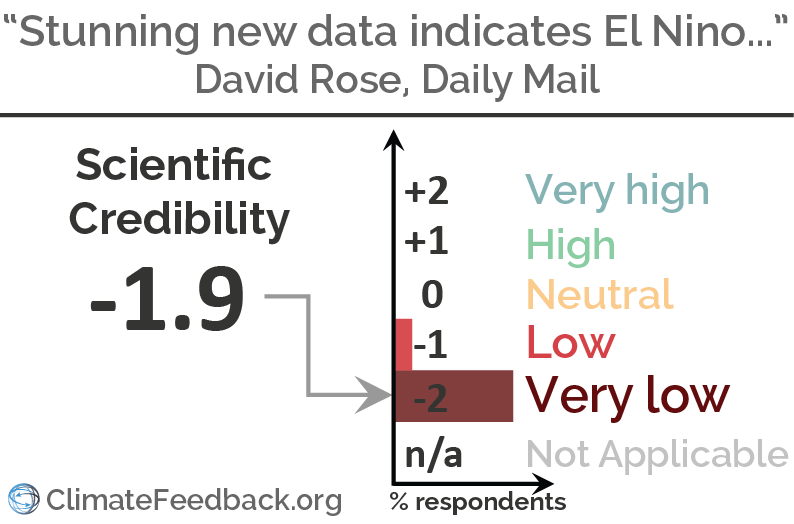
Find more details in the annotations below and in Climate Feedback's analysis
Amid higher global temperatures, sea ice at record lows at poles
Overall scientific credibility: 'very high', according to 5 scientists who analyzed this article.
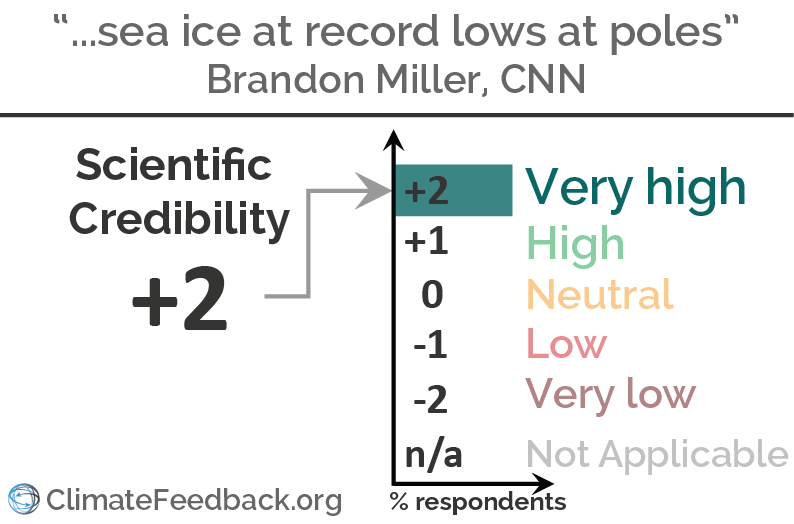
Find more details in the annotations below and in Climate Feedback's analysis
Box 5.1, Figure 1 illustrates the polar amplification phenomenon for three different periods of the Earth’s climate history using tem-perature reconstructions from natural archives and climate model simulations for: (i) the Early Eocene Climatic Optimum (EECO, 54 to 48 Ma) characterised by CO2 concentrations of 1000 to 2000 ppm (Section 5.2.2.2) and the absence of continental ice sheets; (ii) the mid-Pliocene Warm Period (MPWP, 3.3 to 3.0 Ma), characterized by CO2 concentrations in the range of 350 to 450 ppm (Section 5.2.2.2) and reduced Greenland and Antarctic ice sheets compared to today (see Section 5.6.1), (iii) the Last Glacial Maximum (LGM, 21 to 19 ka), characterized by CO2 concentrations around 200 ppm and large continental ice sheets covering northern Europe and North America.
The Phony War Against CO2
Overall scientific credibility: 'very low', according to 6 scientists who analyzed this article.
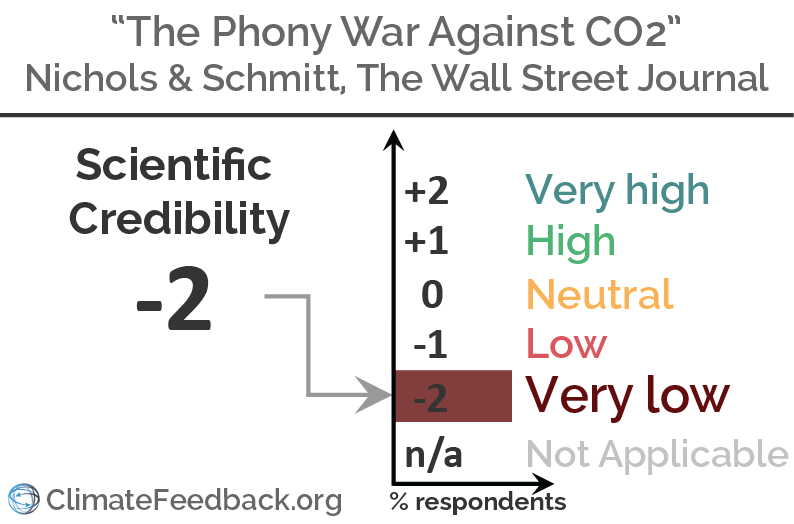
Find more details in the annotations below and in Climate Feedback's analysis
About Those Non-Disappearing Pacific Islands
Overall scientific credibility: 'low', according to 12 scientists who analyzed this article.
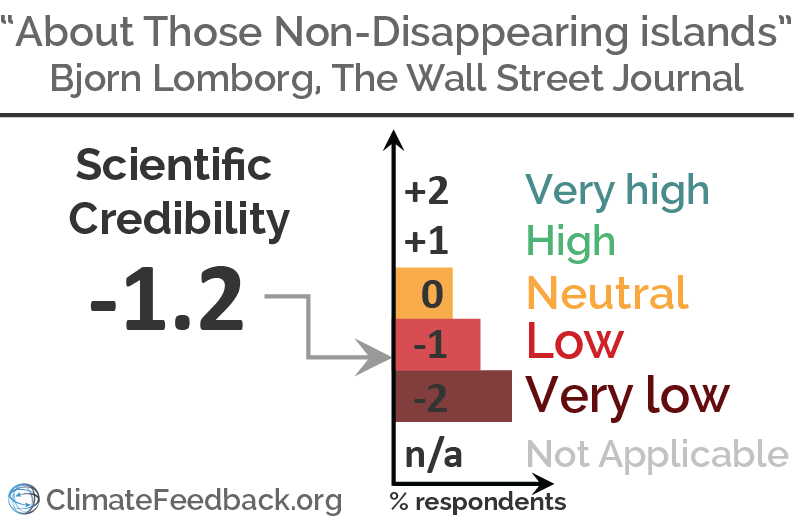
Find more details in the annotations below and in Climate Feedback's analysis
Hillary Clinton Boards The Climate Crisis Train To Nowhere
Overall scientific credibility: 'very low', according to 8 scientists who analyzed this article.
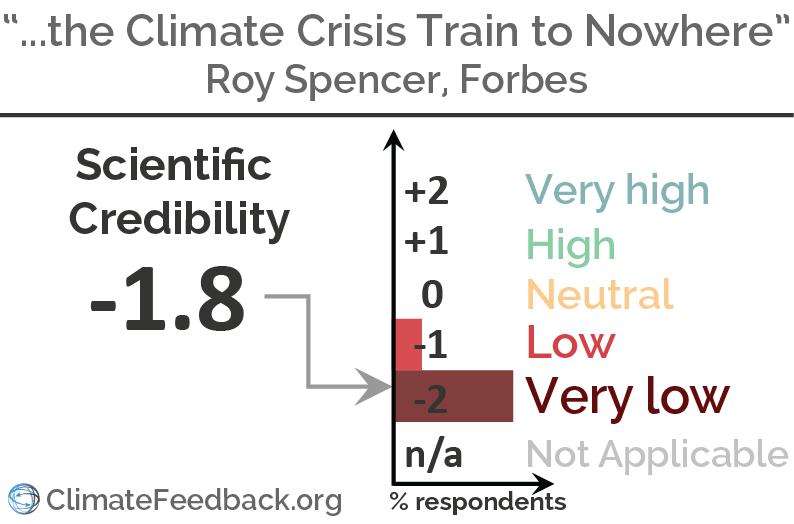
Find more details in the annotations below and in Climate Feedback's analysis
As a climate researcher, I will agree that humans have likely contributed to a portion of recent warmth. I am not a denier of either natural or human-induced climate change. But the observed warming as monitored by satellites (our only truly global monitoring system) has been only about half of what computerized climate models say should be happening.
Peter Gleick, President-Emeritus and Chief Scientist, Pacific Institute:
"This is both wrong, and self-aggrandizing, since Spencer’s professional focus is satellites. I’d also point out the consistent errors in his interpretation of satellite data has resulted in his team having to recompute their data many times to correct for flaws. But more important, there are many, many monitoring systems that show climate change (not just “observed warming”), and these observations are well aligned with model projections.
See, for example, this explanation from Skeptical Science and the Wikipedia page on the UAH satellite temperature dataset"
Sea level rise, which was occurring long before humans could be blamed, has not accelerated and still amounts to only 1 inch every ten years. If a major hurricane is approaching with a predicted storm surge of 10-14 feet, are you really going to worry about a sea level rise of 1 inch per decade?
Peter Gleick, President-Emeritus and Chief Scientist, Pacific Institute:
"A major storm that has a sea-level higher than it would otherwise have been without climate change will simply be more damaging. It doesn’t matter that current SLR changes are slow. Sandy’s storm surge hit at high tide – a tide that was higher than it would otherwise have been because of human-caused climate change. Some estimates are that damages were many billions of dollars higher as a result."
Furthermore, the overall increases in such things as hurricanes and tornadoes have not materialized. Drought in the western U.S. pales in comparison to the mega-droughts tree rings tell us existed in centuries past.
Peter Gleick, President-Emeritus and Chief Scientist, Pacific Institute:
"There are many scientific papers, going back years now, that show the influence of climate changes on the western US droughts. The fact that there have been “mega-droughts” in the past is irrelevant to whether climate changes are now influencing current droughts.]
See:
Swain et al (2014) The Extraordinary California drought of 2013/2014: Character, Context, and the role of climate change Bulletin of the American Meteorological Society
Mann and Gleick (2015) Climate change and California drought in the 21st century Proceedings of the National Academy of Sciences
"
Global warming and climate change, even if it is 100% caused by humans, is so slow that it cannot be observed by anyone in their lifetime.
Peter Gleick, President-Emeritus and Chief Scientist, Pacific Institute:
"This is simply false. Observations of a vast range of human-induced climate change are extensive, documented, and undeniable, from changes in temperature to losses of Arctic ice and glacier extent to sea-level rise to precipitation patterns to sea-surface temperature. This claim by Spencer is egregiously wrong."
“CO2 is going up, but nowhere near as fast as they thought it would. The computer models just weren’t reliable.
Ken Caldeira, Senior Scientist, Carnegie Institution for Science:
"This statement is just plain wrong. Atmospheric CO2 content has recently surpassed 400 ppm and this rate of increase is in line with model projections."
James Lovelock: ‘Before the end of this century, robots will have taken over’
Overall scientific credibility: 'low' to 'very low', according to 5 scientists who analyzed this article.
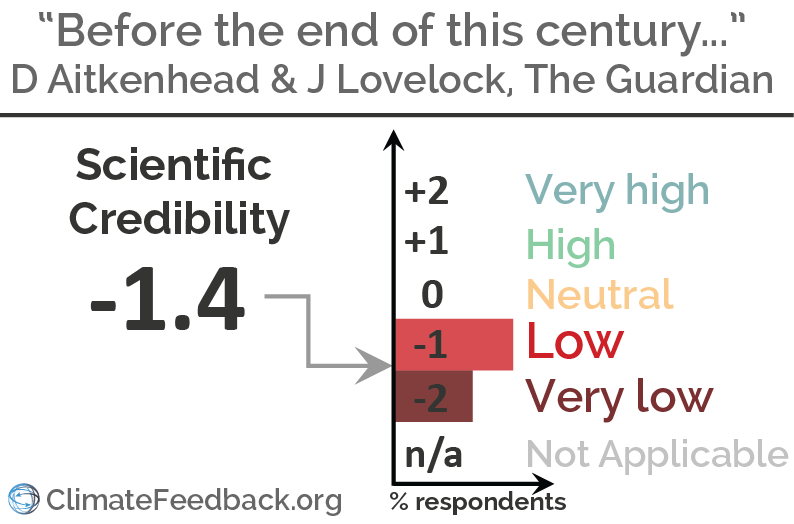
Find more details in the annotations below and in Climate Feedback's analysis
You’ve only got to look at Singapore. It’s two-and-a-half times higher than the worst-case scenario for climate change, and it’s one of the most desirable cities in the world to live in.”
Ken Caldeira, Senior Scientist, Carnegie Institution for Science:
"I am not sure I understand Lovelock’s point about Singapore. Singapore is a relatively wealthy, urbanized country, with an economy that is not highly weather dependent. One would expect Singapore to be able to adapt to temperature changes with far greater ease than would a poor agrarian economy. Also, several studies have projected massive increases in sea-level as a consequence of climate change. Most of Singapore is within 15 meters of sea-level. Thus, if CO2-emissions continue, we can expect most of Singapore to be underwater within a few centuries."
“Let’s see … I think uranium that is affordable to extract would last about 50 years, something in that range. It might be 100. When you’ve used all that up, you go to thorium, and that would last you three times as long as uranium – so, shall we say, about 200 years?” The most sensible energy solution would be to cover 100 sq miles of the Sahara in solar panels. “It would supply the whole of Europe with all the energy they needed,” but it won’t happen “because it would be so easy for terrorists to go and bugger it up”. So for now, nuclear energy is the only viable option.
Ken Caldeira, Senior Scientist, Carnegie Institution for Science:
“It is true that convention uranium resources are insufficient to power civilization for the long-term. However, innovative approaches to extracting uranium from seawater are making uranium extraction from seawater to look increasingly attractive economically. Cost-effective uranium extraction from seawater could power civilization for a very long time. That said, the sun will also last a very long time, so solar power also makes a lot of sense, especially if we could develop good energy storage or global-scale electricity grids that could wheel power to the night side of the Earth."
Experts said Arctic sea ice would melt entirely by September 2016 - they were wrong
3 scientists have analyzed this article and conclude its title is misleading.
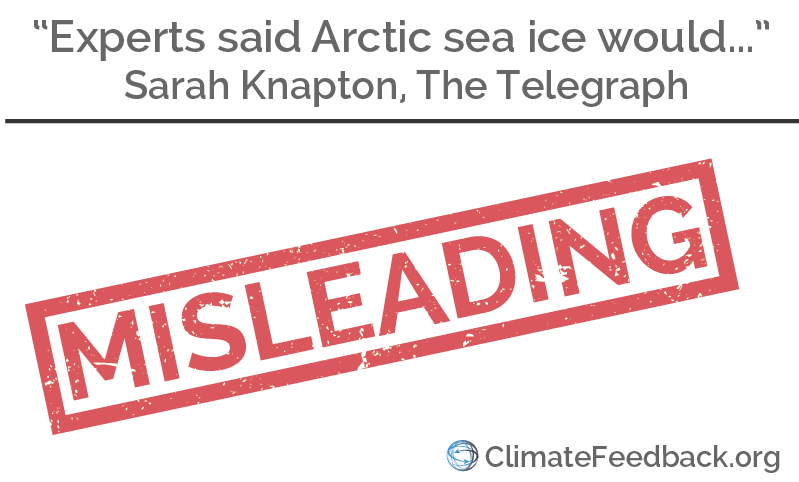
Find more details in Climate Feedback's analysis
In the worst-case scenario, this research suggests, the rate of sea-level rise could reach a foot per decade by the 22nd century, about 10 times faster than today.
Ken Caldeira, Senior Scientist, Carnegie Institution for Science:
“We published the results of a study in Science Advances last year (Winkelmann et al., 2015; Combustion of available fossil fuel resources sufficient to eliminate the Antarctic Ice Sheet) concluding that in a worst case scenario, sea level could be rising at an average rate of a foot per decade, averaged over the next 1000 years. Our model, however, did not include the mechanical instability of ice sheet cliffs considered by DeConto and Pollard (2016; Contribution of Antarctica to past and future sea-level rise), which could potentially result in sea-level rises of this magnitude. A key word here is 'could'. More work needs to be done to assess the likelihood of this occurrence, but sea-level rise rates of a foot per decade by year 2100 appear to be a real risk posed by our greenhouse gas emissions.”
Federal scientists have documented a sharp jump in this nuisance flooding — often called “sunny-day flooding” — along both the East Coast and the Gulf Coast in recent years.
William Sweet, Oceanographer, NOAA Center for Operational Oceanographic Products and Services:
This refers to the historical analysis of "nuisance" tidal flooding frequencies (days per year) which we assessed in Sweet et al. (2014). In this report we looked at all tide gauges with hourly data since 1980 and with a threshold for "minor" impacts.<br> As defined locally by the NOAA National Weather Service (NWS) Weather Forecasting Offices (WFO) in conjunction with local emergency managers, these thresholds are based upon empirical data collected over a couple decades that describes the level of impacts a community is likely to experience. When minor flooding (nuisance) is expected, the WFO typically issues a "coastal flood advisory"; they issue a coastal flood warning when levels are expected to reach moderate or major levels. The minor thresholds I started calling "nuisance levels" and the phrase caught on. Generally nuisance levels vary from 1-2 feet around the U.S. They are not defined on all tide gauges however.<br> The NWS has a website (AHPS) that includes some of the tide gauge thresholds along with river gauges.
Climate Exaggeration is Backfiring
Overall scientific credibility: 'very low', according to 9 scientists who analyzed this article.
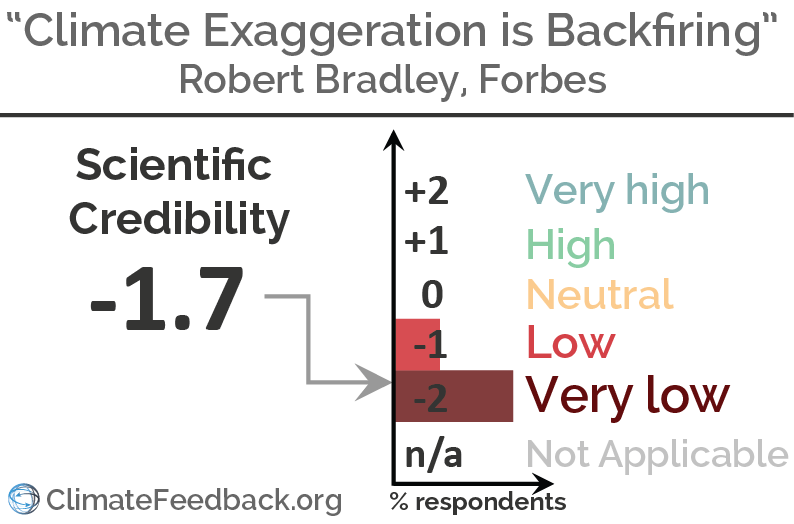
Find more details in the annotations below and in Climate Feedback's analysis
Greenland's huge annual ice loss is even worse than thought
Overall scientific credibility: 'very high', according to 7 scientists who analyzed this article.
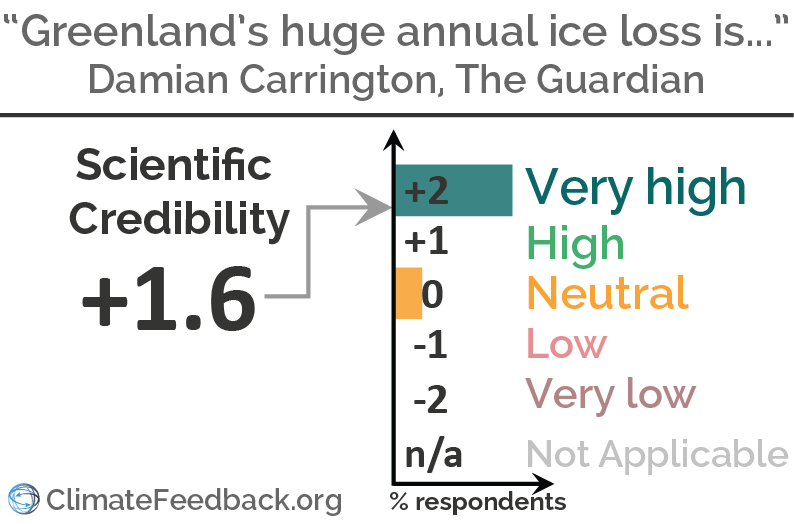
Find more details in the annotations below and in Climate Feedback's analysis
Flooding of Coast,Caused by Global Warming,Has Already Begun
Overall scientific credibility: 'very high', according to 12 scientists who analyzed this article.
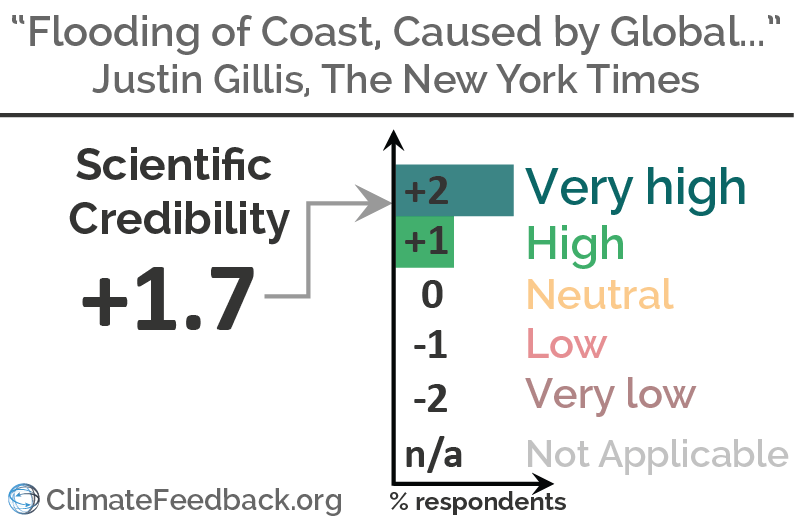
Find more details in the annotations below and in Climate Feedback's analysis
Along the East Coast, scientists with the National Oceanic and Atmospheric Administration say that many communities have already, or will soon, pass a threshold where sunny-day flooding starts to happen much more often.
William Sweet, Oceanographer, NOAA Center for Operational Oceanographic Products and Services:
"This relates to the Sweet and Park (2014) paper that uses a 30 days/year threshold as a definition of a tipping point. Though the 30 day/year threshold is somewhat arbitrary, it is sufficiently high that once a region experiences this many, the conversation of what to do to address sea level rise tidal flooding has likely forefront.
The "soon" part refers to the fact that days/year has (East and Gulf Coast locations) and will continue to accelerate with steady (linear) rises in sea level. In this paper, I just looked at tide gauges with hourly data since 1950 (to better assess contribution of El Niño to the trend) and with a threshold defined (see below for threshold definition)."
Federal scientists have documented a sharp jump in this nuisance flooding — often called “sunny-day flooding” — along both the East Coast and the Gulf Coast in recent years. The sea is now so near the brim in many places that they believe the problem is likely to worsen quickly. Shifts in the Pacific Ocean mean that the West Coast, partly spared over the past two decades, may be hit hard, too.
Josh Willis, Project Scientist, NASA Jet Propulsion Laboratory:
"This is accurate. Global sea levels have risen by about 20 cm due to human induced global warming in the last 100 years. Both US coasts have experienced this. It is true that subsidence on the east coast has exacerbated this and the last 20 years of natural variations on the west coast may have given folks a false sense of security because it has opposed or hidden the global rise experienced almost everywhere else. Overall this paragraph is very accurate."
In 2013, scientists reached a consensus that three feet was the highest plausible rise by the year 2100. But now some of them are starting to say that six or seven feet may be possible.
Ken Caldeira, Senior Scientist, Carnegie Institution for Science:
“This is a correct statement, but a key word is 'some of them'.<br> There have been some people, notably Jim Hansen, who, as I understand it, have been proposing high rates of sea-level rise without providing a mechanism for these sea-level rise rates that seemed plausible to most glaciologists. It is my understanding that the mechanisms proposed by DeConto and Pollard (i.e., mechanical instability of ice cliffs) does appear to be plausible and has some support in observations of ice shelf break-up that has already occurred in Antarctica. In other words, if this sentence were written a year ago, "some of them" would have referred to a few scientists who hold what might be considered 'outlier' views. Following the work of DeConto, Pollard, and others, my sense is that the risk of very high rates of sea-level rise seems substantially higher, even to what might be considered 'mainstream' scientists."
‘Next year or the year after, the Arctic will be free of ice’
Overall scientific credibility: 'low', according to 7 scientists who analyzed this article.
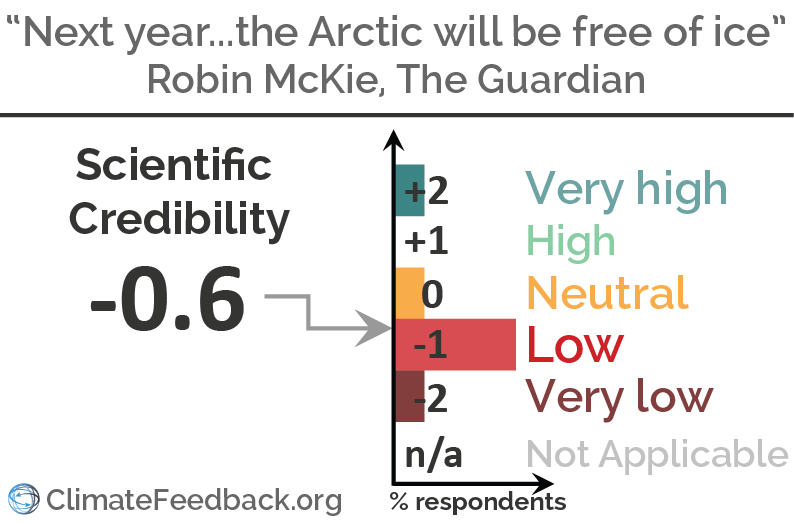
Find more details in the annotations below and in Climate Feedback's analysis
Disasters like Louisiana floods will worsen as planet warms, scientists warn
Overall scientific credibility: 'high', according to the 7 scientists who analyzed this article.
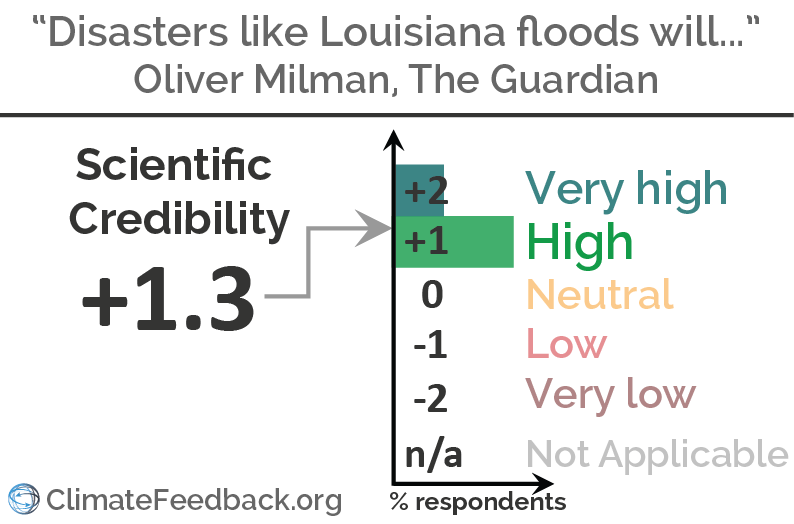
Find more details in the annotations below and in Climate Feedback's analysis
Environmental records shattered as climate change 'plays out before us'
Overall scientific credibility: 'high', according to the 8 scientists who analyzed this article.
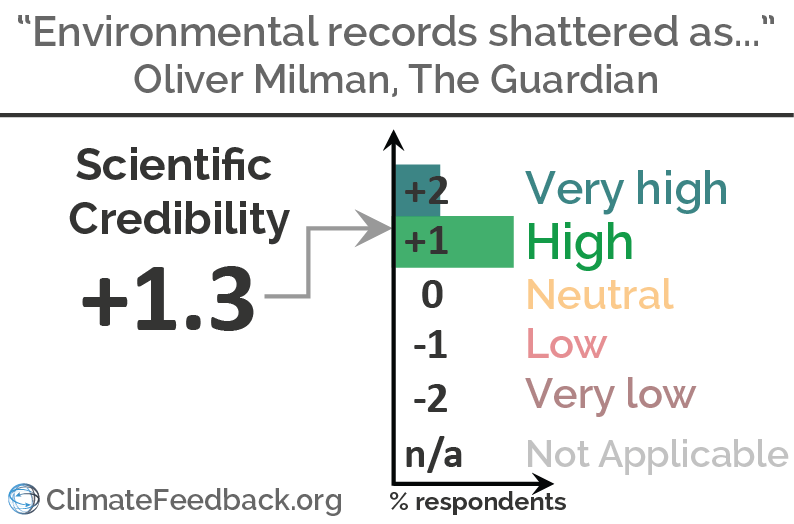
Find more details in the annotations below and in Climate Feedback's analysis
What science can tell us about the links between global warming and massive heat waves The inside track on Washington politics. Be the first to know about new stories from PowerPost. Sign up to follow, and we’ll e-mail you free updates as they’re published. You’ll receive free e-mail news updates each time a new story is published. You’re all set! Sign up *Invalid email address Got it Got it
Overall scientific credibility: 'very high' to 'high', according to the 10 scientists who analyzed this article.
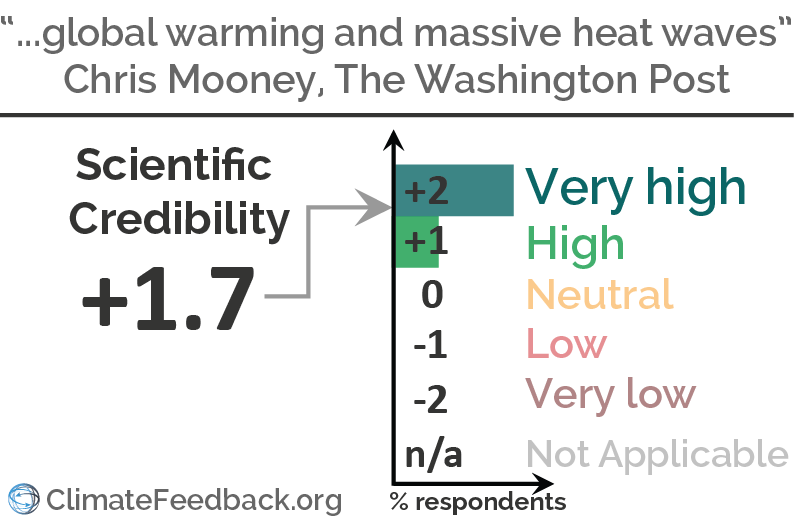
Find more details in the annotations below and in Climate Feedback's analysis
Scientists warn of 'global climate emergency' over shifting jet stream
Overall scientific credibility: 'very low', according to 5 scientists who analyzed this article.
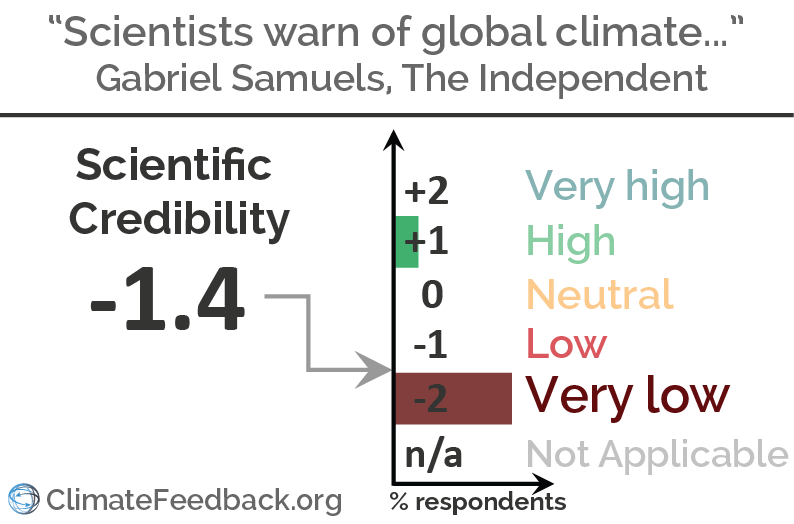
Find more details in the annotations below and in Climate Feedback's analysis
Two environmentalists have declared a “global climate emergency” after the Northern hemisphere jet stream was found to have crossed the equator, bringing “unprecedented” changes to the world’s weather patterns.
Clifford Mass, Professor of Atmospheric Sciences, University of Washington:
“This is total nonsense. Flow often crosses the equator. The cross-equator flow identified by Scribbler and Beckwith is not between mid-latitude jet streams, as claimed. The analysis is making mistakes that even one of my junior undergrads would not make”
Scribbler and Beckwith
This sentence has been changed. It originally read "The scientists" as seen on the Internet Archive.
Two environmentalists have declared
This sentence has been changed. It originally read "Environmental scientists have declared" as seen on the Internet Archive.
However other scientists dismissed their claims, with one describing their concern over wind crossing the equator as "total nonsense".
This sentence has been added on July 1st, it did not appear in the original version of the article as seen on the Internet Archive.
Other scientists have since dismissed the claims as 'total nonsense'
This subtitle has been changed. It originally read "Experts say drastic weather changes could cause 'massive hits to food supply' and 'death of winter'" as seen on the Internet Archive.
An examination of total leaf area, he notes, doesn’t record whether a particular area has changed its type of vegetation, say from smaller tundra shrubs to small trees.
Jacqueline Mohan, Associate Professor, University of Georgia:
Early studies by Jerry Melillo et al. in Abisko, Sweden demonstrated that warmer temperatures and higher levels of CO2 caused this Arctic tundra to shift from being dominated by lichens and moss, which reindeer eat, to shrubs. Thus, it is important to consider not just the greeness of an ecosystem but also its composition. Reindeer prefer mosses and lichens, not woody shrubs, for example.
Earlier this month, NASA scientists provided a visualization of a startling climate change trend — the Earth is getting greener, as viewed from space, especially in its rapidly warming northern regions. And this is presumably occurring as more carbon dioxide in the air, along with warmer temperatures and longer growing seasons, makes plants very, very happy.
Peter Reich, Regents Professor, University of Minnesota:
The point in the second sentence may be true for areas where longer growing seasons and warmer temperatures do increase productivity, but it is likely false for vast other regions of the world where lack of moisture will outweigh positive impacts of global change on growth. So this sentence right off the bat gives a bit of a mis-representation but being worded in a way that can be construed as applying globally not just in the far north. Also there is nothing “startling” about this trend - it is exactly as hypothesized for such regions.
Thanks to climate change, the Arctic is turning green The inside track on Washington politics. Be the first to know about new stories from PowerPost. Sign up to follow, and we’ll e-mail you free updates as they’re published. You’ll receive free e-mail news updates each time a new story is published. You’re all set! Sign up *Invalid email address Got it Got it
Overall scientific credibility: 'neutral' to 'high', according to the 8 scientists who analyzed this article.
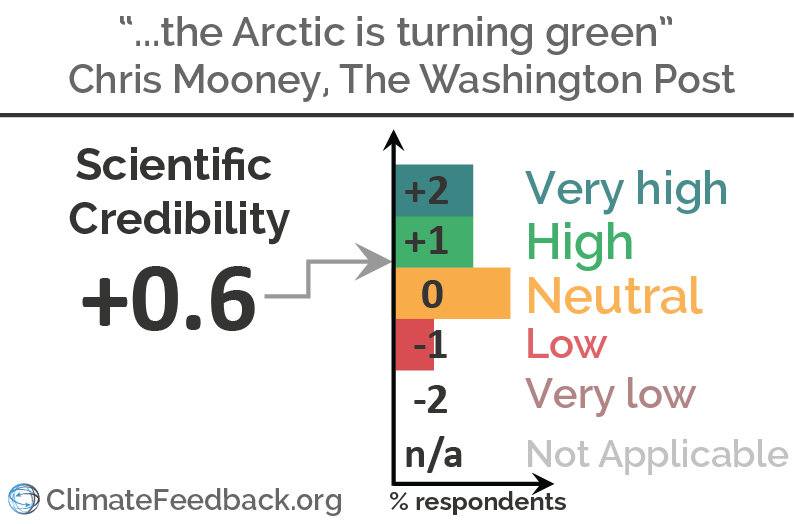
Find more details in the annotations below and in Climate Feedback's analysis
No one ever says it, but in many ways global warming will be a good thing
Overall scientific credibility: 'low' to 'very low', according to 14 scientists who analyzed this article.
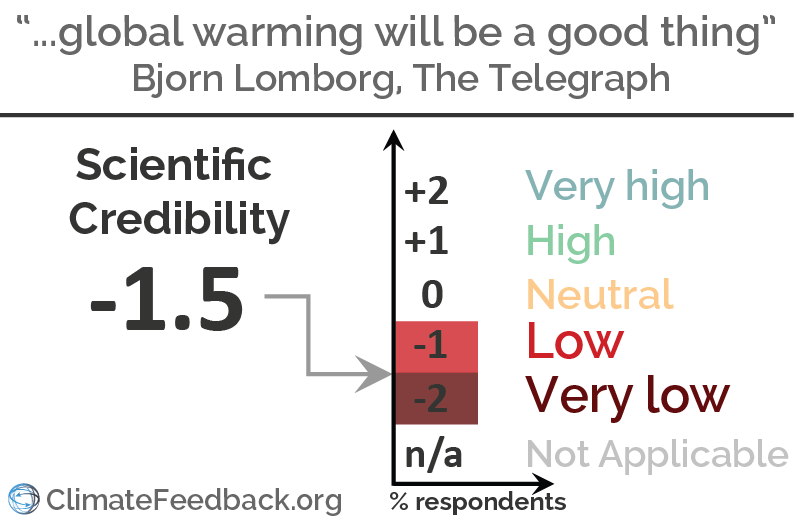
Find more details in the annotations below and in Climate Feedback's analysis
What we don’t hear from her is that fewer people will die from cold.
This claim is not supported by available evidence and has been thoroughly discussed in a previous Climate Feedback analysis of an op-ed by Bjorn Lomborg.
For instance, Aaron Bernstein, Associate Director of the Center for Health and the Global Environment in Harvard commented:
While it’s true that cold may kill more people today than heat, Lomborg’s assertion that climate change will result in fewer overall deaths in the U.S. this century from extreme temperatures is not supported by available evidence.
Great Barrier Reef may perish by 2030s as ocean temperatures skyrocket, study finds
Overall scientific credibility: 'high', according to 6 scientists who analyzed this article.
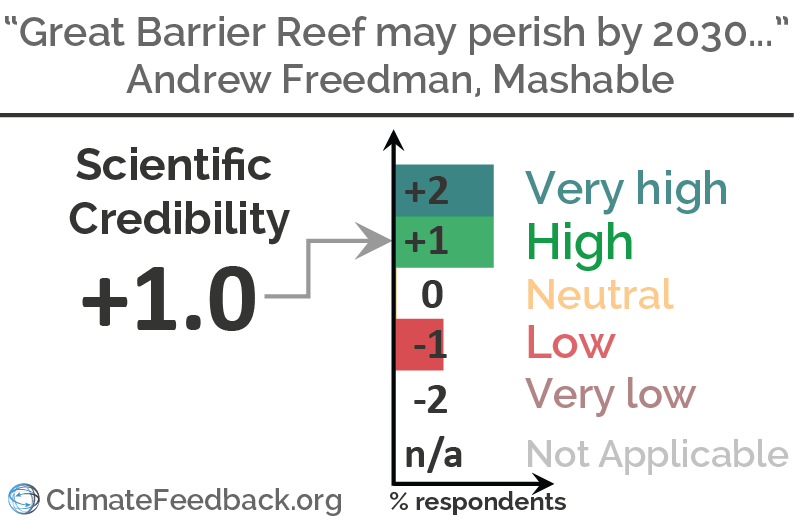
Find more details in the reply+annotations below and in Climate Feedback's analysis
An Overheated Climate Alarm
Overall scientific credibility: 'low' to 'very low', according to 10 scientists who analyzed this article.
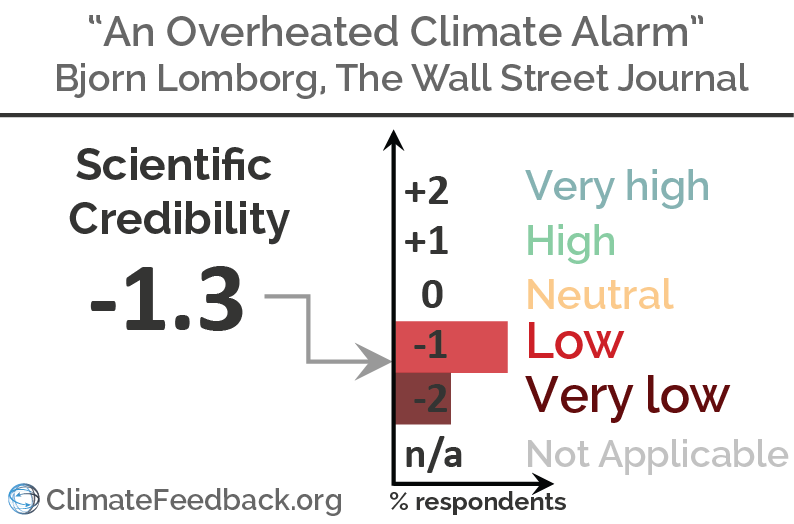
Find more details in the reply+annotations below and in Climate Feedback's analysis
Consider where they move. Migration patterns show people heading for warm states like Texas and Florida, not snowy Minnesota and Michigan.
Kristie Ebi, Professor of Global Health, University of Washington:
This has more to do with economic factors than weather. If people moved only because of poor weather, why hasn’t everyone left Northern Europe?
the administration’s new report is contradicted by a large number of scientific studies from around the globe
Kristie Ebi, Professor of Global Health, University of Washington:
This is an exaggeration; only one study was cited. The subsequent citations miss papers such as Kinney et al. and focus on three papers that support his hypothesis, one from 2006 and one from 2009. Re Vardoulakis et al. 2014 assumes that winter mortality is temperature-related, which other papers show not to be the case or to be only weakly associated. The UK does seem to have a stronger association between cold temperatures and mortality.
In the U.S. about 9,000 people die from heat each year but 144,000 die from cold.
Kristie Ebi, Professor of Global Health, University of Washington:
Where do these numbers come from? According to a review of national health statistics:
During 2006–2010, about 2,000 U.S. residents died each year from weather-related causes. About 31% of these deaths were attributed to exposure to excessive natural heat, heat stroke, sun stroke, or all; 63% were attributed to exposure to excessive natural cold, hypothermia, or both; and the remaining 6% were attributed to floods, storms, or lightning.
This statement also confuses seasonal mortality with mortality from extreme events. As noted in Ebi and Mills, this distinction is important for understanding what could happen with climate change.
cold kills many more people than heat
Kristie Ebi, Professor of Global Health, University of Washington:
Mr. Lomborg is confusing seasonal mortality with temperature-related mortality. It is true that mortality is higher during winter than summer. However, it does not follow that winter mortality is temperature-dependent (which summer mortality is). Dave Mills and I reviewed the evidence and concluded that only a small proportion of winter mortality is likely associated with temperature. Growing numbers of publication are exploring associations between weather and winter mortality, with differences in methods and results. The country with the strongest association between winter mortality and temperature is England, which appears in other publications to be at least partly due to cold housing. Winter mortality is lower in northern European countries.
climate change will also reduce the number of cold days and cold spells. That will cut the total number of cold-related deaths.
Kristie Ebi, Professor of Global Health, University of Washington:
There is very limited scientific support that reducing the number of cold days (by which he apparently means winter) will reduce the number of cold-related deaths. Again, this is assuming winter mortality is temperature-dependent; an assumption not verified by research in the US and elsewhere.
If humans make no attempts whatsoever to adapt
Kristie Ebi, Professor of Global Health, University of Washington:
Efforts to adapt to the health risks of climate change recently started based on observed impacts and projected risks, and with significant efforts by the World Health Organization and others to raise awareness of the risks and of adaptation and mitigation policies and programs needed to prepare for and manage current and projected risks. Individuals like Mr. Lomborg and others who downplay the risks encourage a lack of action.
presumably to underscore its reliability
Kristie Ebi, Professor of Global Health, University of Washington:
"It could also be noted that the assessment followed the standard process used by USGCRP, including extensive peer review."
What we’re doing to the Earth has no parallel in 66 million years, scientists say The inside track on Washington politics. Be the first to know about new stories from PowerPost. Sign up to follow, and we’ll e-mail you free updates as they’re published. You’ll receive free e-mail news updates each time a new story is published. You’re all set! Sign up *Invalid email address Got it Got it .hideText{position:absolute;left:-10000px}
Overall scientific credibility: 'very high' to 'high', according to 7 scientists who analyzed this article.
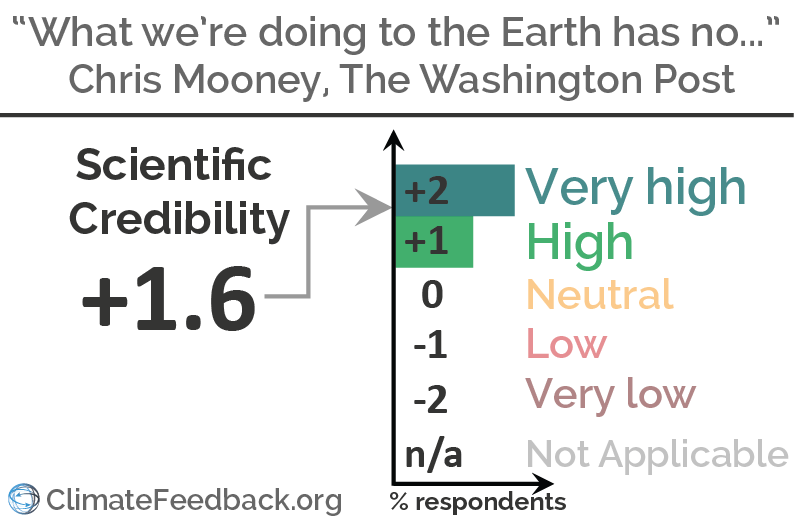
Find more details in the reply+annotations below and in Climate Feedback's analysis
Scientists ‘are exaggerating carbon threat to marine life’
Overall scientific credibility: 'very low' according to 5 scientists who analyzed this article.
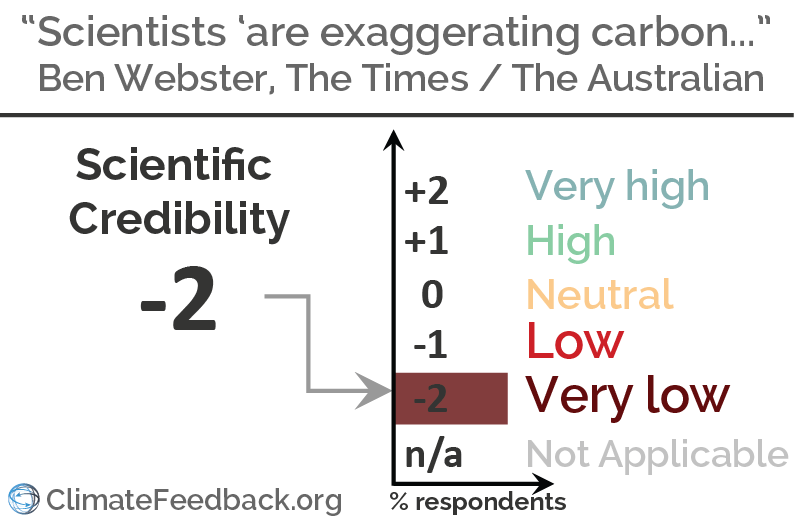
Find more details in the reply+annotations below and in Climate Feedback's analysis
Scientists ‘are exaggerating carbon threat to marine life’
Howard Browman, Principal Research Scientist Institute of Marine Research in Norway:
"I spoke with Ben Webster of The Times in a 30-minute phone call and explained that the objective of the special issue he was reporting on was to introduce more balance into the topic of Ocean Acidification. He cherry-picked our conversation and presented phrases out of context - seemingly in order to be sensational - despite the fact that I told him that the press was part of the "exaggeration" problem. For example, the quoted phrase "inherent bias" in the first paragraph is not the same as the "publication bias" that I refer to in my introduction. Further, my introduction does not say that the existing literature is "exaggerating" the effects of ocean acidification, but that more careful interpretation is required. Finally, I am not saying that the special issue overturns previous literature on the topic, as the Times suggests, but that they should be taken together, in balance. Very disappointing."
Seas Are Rising at Fastest Rate in Last 28 Centuries
Overall scientific credibility: 'very high' to 'high', according to 7 scientists who analyzed this article.
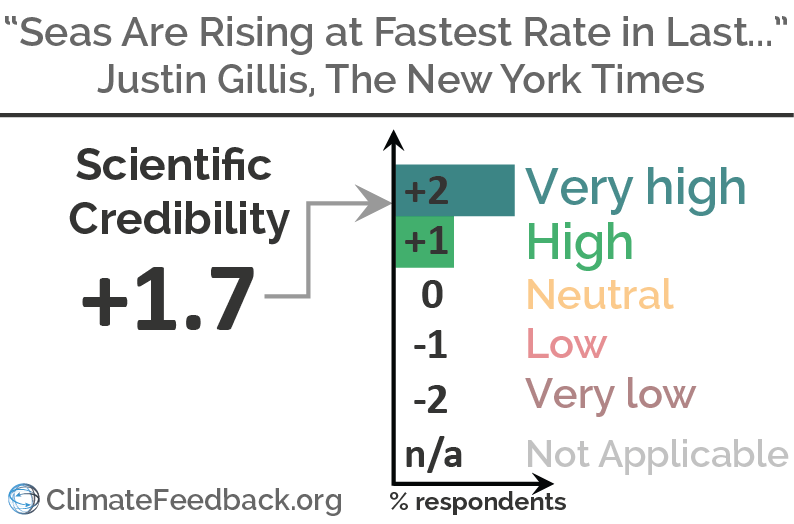
Find more details in the reply+annotations below and in Climate Feedback's analysis
The Climate Snow Job
Overall scientific credibility: 'very low' to 'low', according to 10 scientists who analyzed this article.
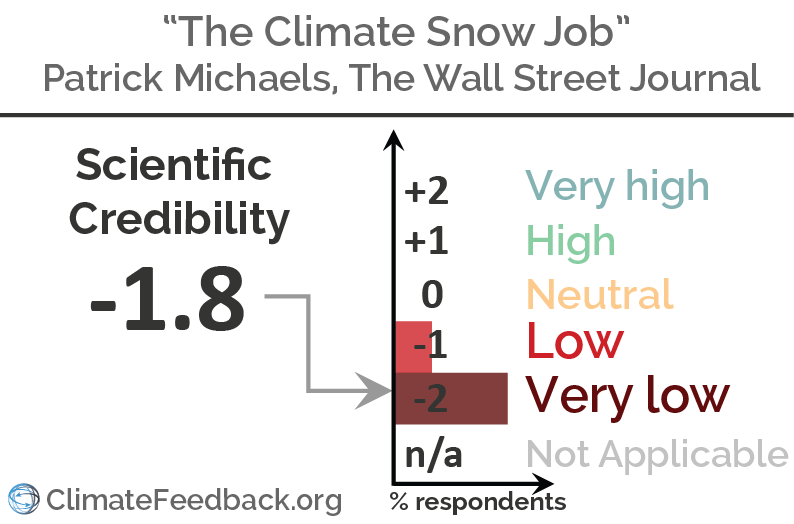
Find more details in the reply+annotations below and in Climate Feedback's analysis
The notion that world-wide weather is becoming more extreme is just that: a notion, or a testable hypothesis. As data from the world’s biggest reinsurer, Munich Re, MURGY 1.56 % and University of Colorado environmental-studies professor Roger Pielke Jr. have shown, weather-related losses haven’t increased at all over the past quarter-century. In fact, the trend, while not statistically significant, is downward.
Dr. Laurens M. Bouwer, Senior Advisor Risk Analysis, Deltares:
This statement is not accurate, as 1) The main point is that up to now, we do not see an increase in loss records such as from Munich Re, due to anthropogenic climate change. That is not to say there is no increase in extreme weather, because there is. See IPCC SREX and AR5 reports, to which I also contributed. There is no signal in most loss records from floods and storms, though. So Patrick Michaels is misusing scientific information and consensus.
And 2) it misses a point: there is an upward trend in losses, only after correction for population growth and wealth increase, this trend disappears. See also the paper Roger Pielke and Munich Re wrote together, with me: Confronting Disaster Losses
And also this recent review I did (freely accessible): Have Disaster Losses Increased Due to Anthropogenic Climate Change?
2015 Was Hottest Year in Historical Record, Scientists Say
Overall scientific credibility: 'very high', according to 8 scientists who analyzed this article.
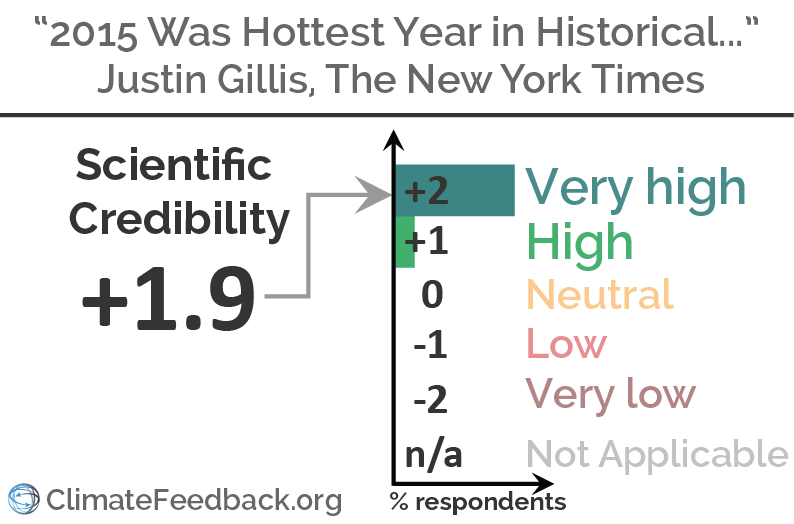
Find more details in the reply+annotations below and in Climate Feedback's analysis
2015 Was Not Even Close To Hottest Year On Record
Overall scientific credibility: 'very low', according to 10 scientists who analyzed this article.
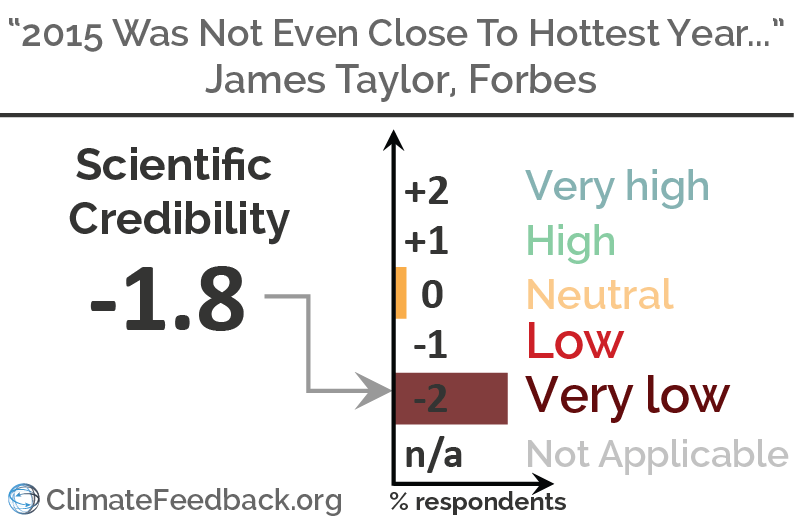
Find more details in the reply+annotations below and in Climate Feedback's analysis
Scientists say human greenhouse gas emissions have canceled the next ice age
Overall scientific credibility: 'very high', according to 8 scientists who analyzed this article.
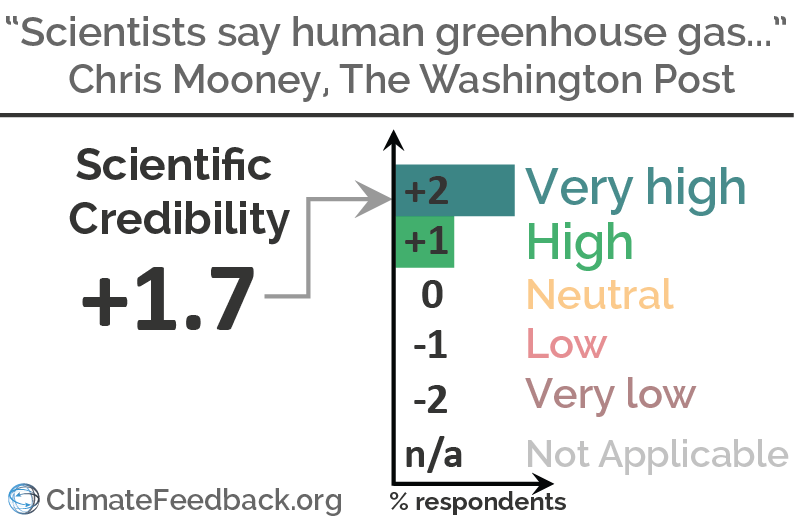
Find more details in the reply+annotations below and in Climate Feedback's analysis
Your Complete Guide to the Climate Debate
Overall scientific credibility: 'very low' to 'low', according to 12 scientists who analyzed this article.
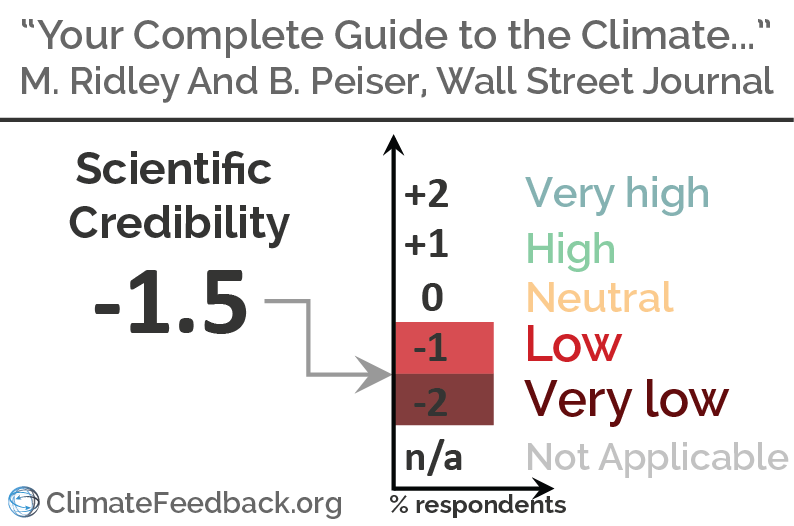
Find more details in the reply+annotations below and in Climate Feedback's analysis
The latest science on the “sensitivity” of the world’s temperature to a doubling of carbon-dioxide levels (from 0.03% of the air to 0.06%) is also reassuring. Several recent peer-reviewed studies of climate sensitivity based on actual observations, including one published in 2013 in Nature Geoscience with 14 mainstream IPCC authors, conclude that this key measure is much lower—about 30%-50% lower—than the climate models are generally assuming.
Steven Sherwood, Professor, University of New South Wales:
The statements on “sensitivity” now being thought to be lower are unrepresentative of the recent work on this topic. Most recent studies actually are implying higher sensitivity, and are finding problems with the ones that claim lower sensitivity.
anything from mildly beneficial
Steven Sherwood, Professor, University of New South Wales:
The assertion that 1.5C of warming would be “beneficial” is one that very few scientists or economists would agree with other than Richard Tol. It is true that CO2-induced greening will be beneficial, but how beneficial compared to the problems from greater heat and shifting rainfall patterns is dubious at best.
Sea level continues its centuries-long slow rise—about a foot a century—with no sign of recent acceleration
Steven Sherwood, Professor, University of New South Wales:
The statement that sea-level rise is “centuries long” is false—sea level was falling until carbon dioxide levels rose significantly from human activities.
but Antarctic sea ice has increased, and Antarctica is gaining land-based ice, according to a new study by NASA scientists published in the Journal of Glaciology.
Steven Sherwood, Professor, University of New South Wales:
The point on Antarctic ice is misleading and cherry-picking. Everywhere on Earth except Antarctica, it is clear we are losing ice. The new Antarctic study reporting gains in ice is contradicted by gravitometric observations showing ice mass decreasing. The new study actually measures thickness rather than mass, so mass is probably decreasing even in Antarctica. It is true that sea-ice is increasing but this is consistent with reduced salinity of water caused by the increased precipitation expected from global warming.
Also, it is increasingly clear that the planet was significantly warmer than today several times during the past 10,000 years.
Steven Sherwood, Professor, University of New South Wales:
This statement is also not consistent with current evidence, and irrelevant since what matters is the predicted future warming which will surely be unprecedented.
there has been no increase in frequency or intensity of storms, floods or droughts, while deaths attributed to such natural disasters have never been fewer,
Steven Sherwood, Professor, University of New South Wales:
This statement is also not justified as several studies are now reporting increases in severe rains and in storm damages even when non-environmental factors are accounted for. Moreover the authors ignore heat waves which show the clearest increase and kill more people than the ones they mention.
world temperatures, because they have gone up only very slowly, less than half as fast as the scientific consensus predicted in 1990
Steven Sherwood, Professor, University of New South Wales:
This statement is false. The IPCC predicted that warming between 2015 and 1990 would be within about 0.35 and 0.60C; the actual temperature in 2015 will be about 0.5C above the average of years around 1990, so a bit above the middle of the range originally predicted by the IPCC.
Updated NASA Data: Global Warming Not Causing Any Polar Ice Retreat
Overall scientific credibility: 'very low', according to 9 scientists who analyzed this article.
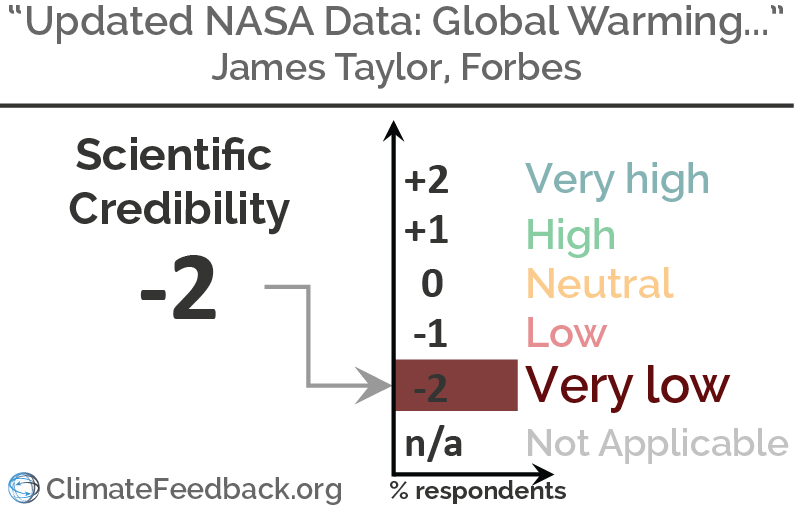
Find more details in the reply+annotations below and in Climate Feedback's analysis
The Facts Pollen is a product and mechanism of plant reproduction and growth. As such, pollen counts will rise and fall along with plant health and vegetation intensity. Any increase in pollen will be the result of a greener biosphere with more plant growth.
Kristie L. Ebi, Professor of Global Health, University of Washington:
Mr. Taylor does not address this important public health issue, instead he focuses on the value of a greener biosphere. Mr. Taylor might have looked at the conclusions from the US National Assessment on human health, which states that:
Climate change, resulting in more frost-free days and warmer seasonal air temperatures, can contribute to shifts in flowering time and pollen initiation from allergenic plant species, and increased CO2 by itself can elevate production of plant-based allergens. Higher pollen concentrations and longer pollen seasons can increase allergic sensitizations and asthma episodes, and diminish productive work and school days.
Asserting, without any supporting data or evidence, that a disease that prospers in cool climates will become more prevalent as a result of global warming defies objective data and common sense.
Kristie L. Ebi, Professor of Global Health, University of Washington:
The supporting evidence is one 2008 review of the spatial dynamics of Lyme disease by Killilea et al. The authors did conclude that the presence of forests was associated with increased risk of Lyme disease. They also concluded that the reasons for variations across forested areas are poorly understood, and that significant progress is needed in identifying the determinants of spatial variation in risk and incidence.
Between the year 2000 and 2015, there has been 31 publications on Lyme disease and climate change providing significantly more information. The recent US National Assessment Health Chapter concluded that:
Potential impacts of climate change on the transmission of Lyme disease include: 1) changes in the geographic distribution of the disease due to the increase in favorable habitat for ticks to survive off their hosts; 2) a lengthened transmission season due to earlier onset of higher temperatures in the spring and later onset of cold and frost;